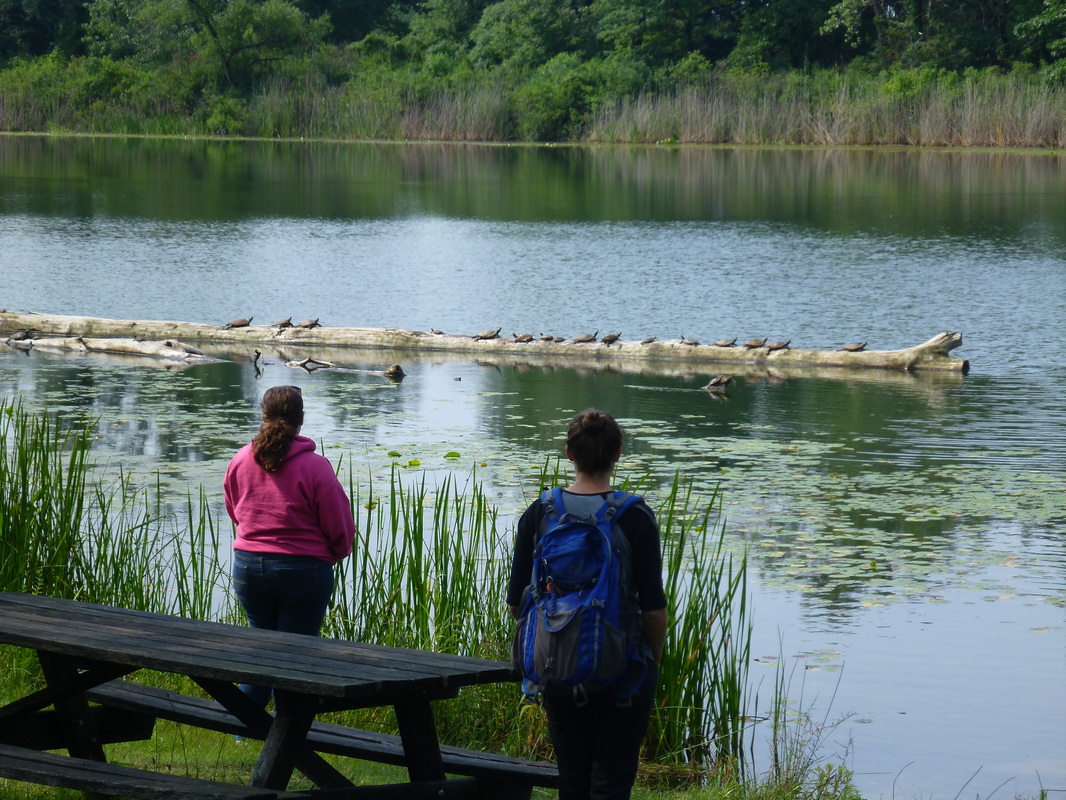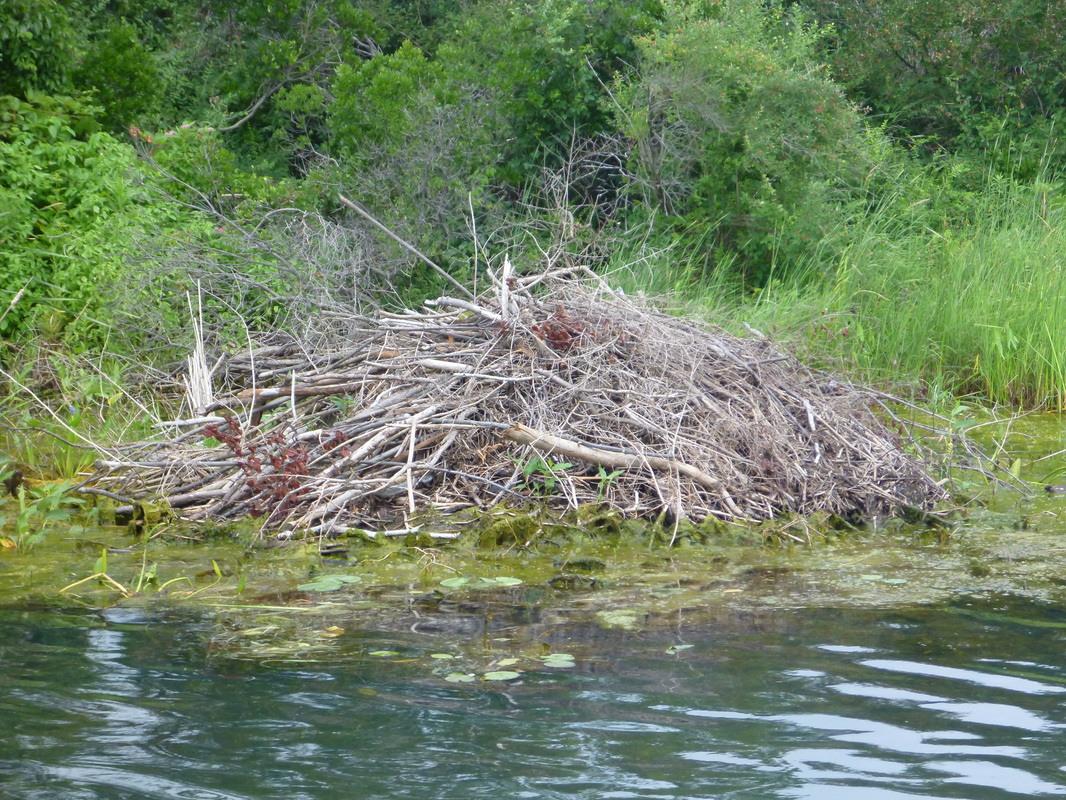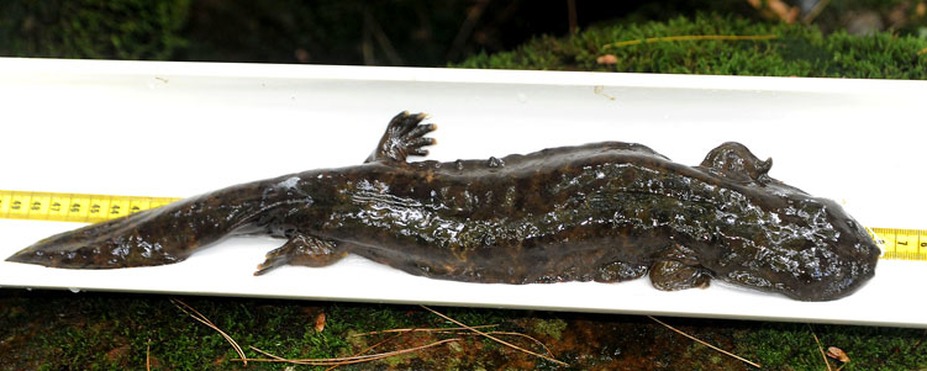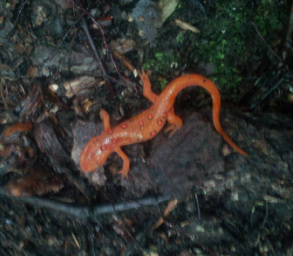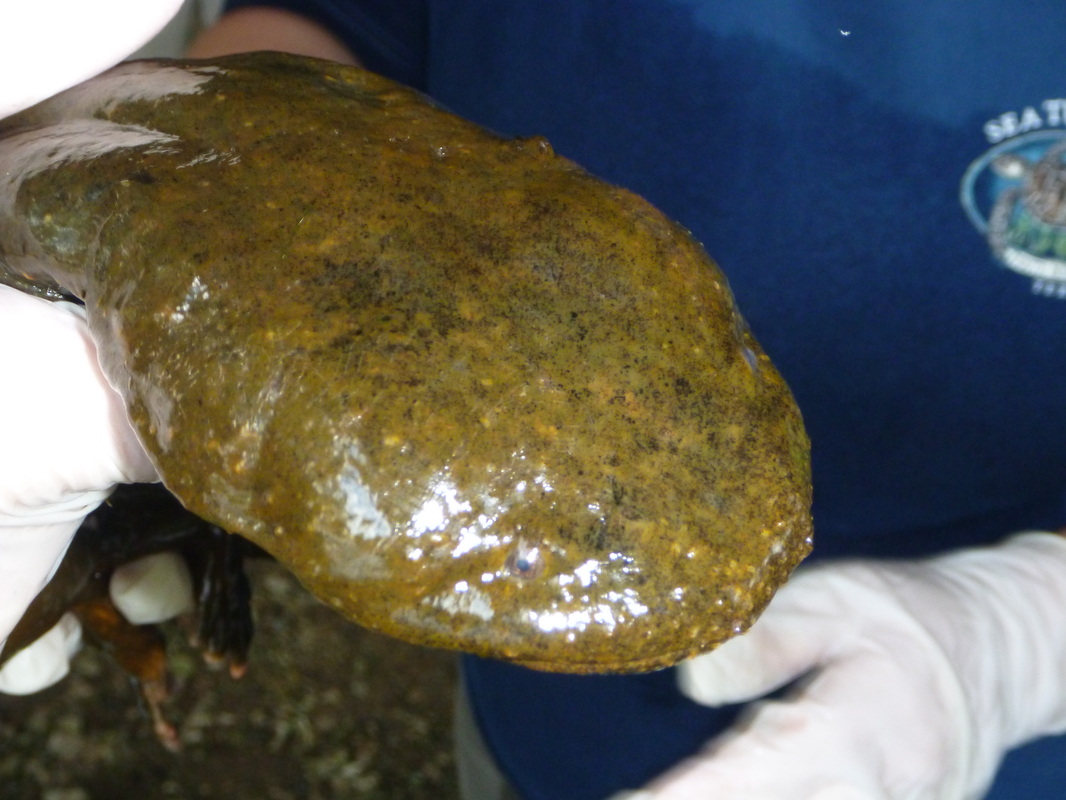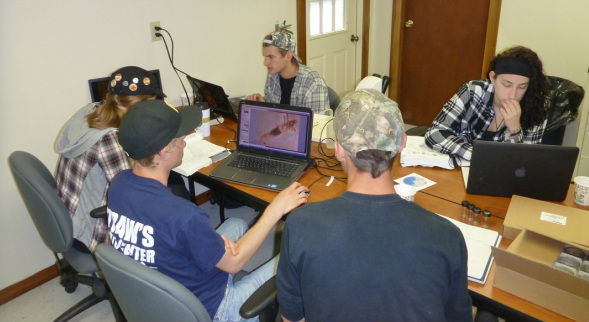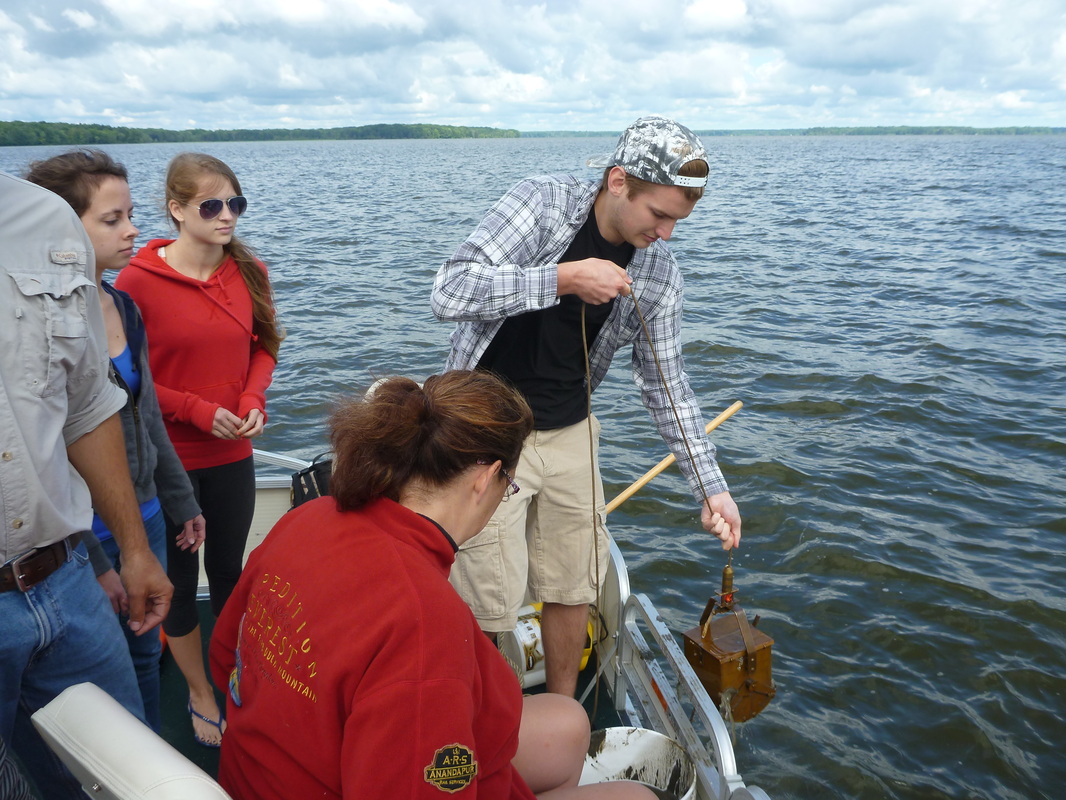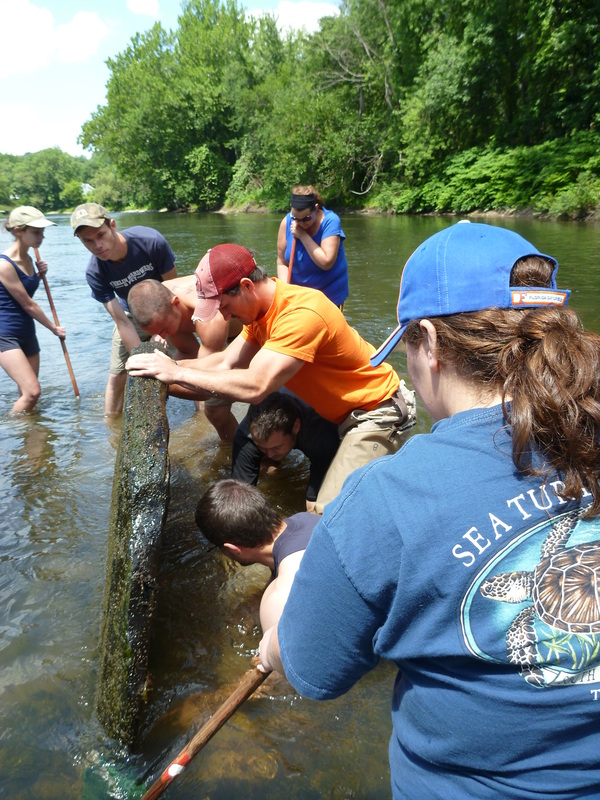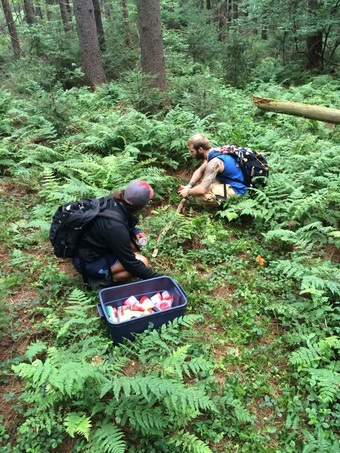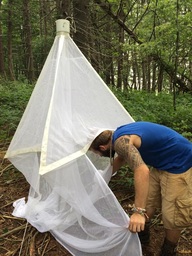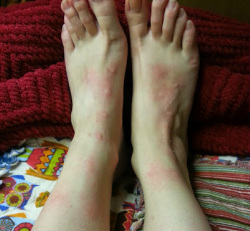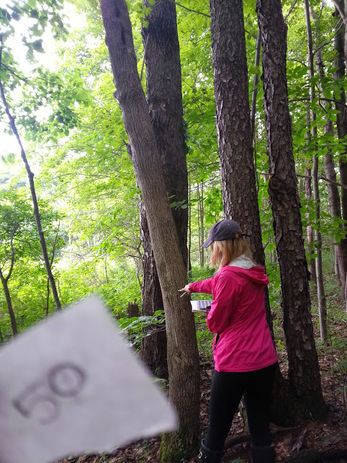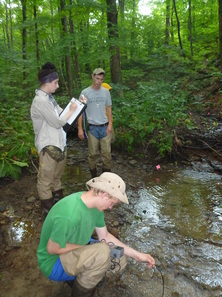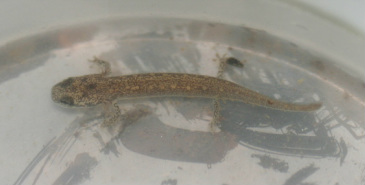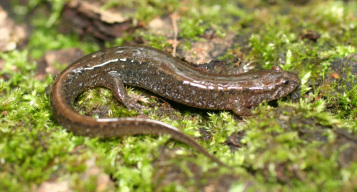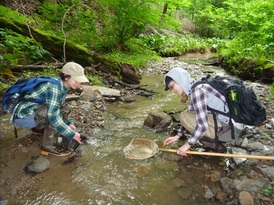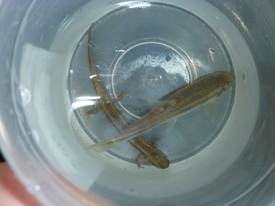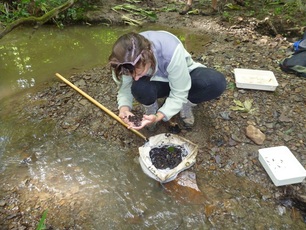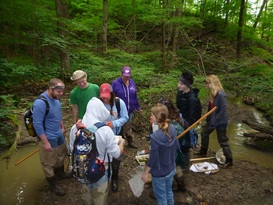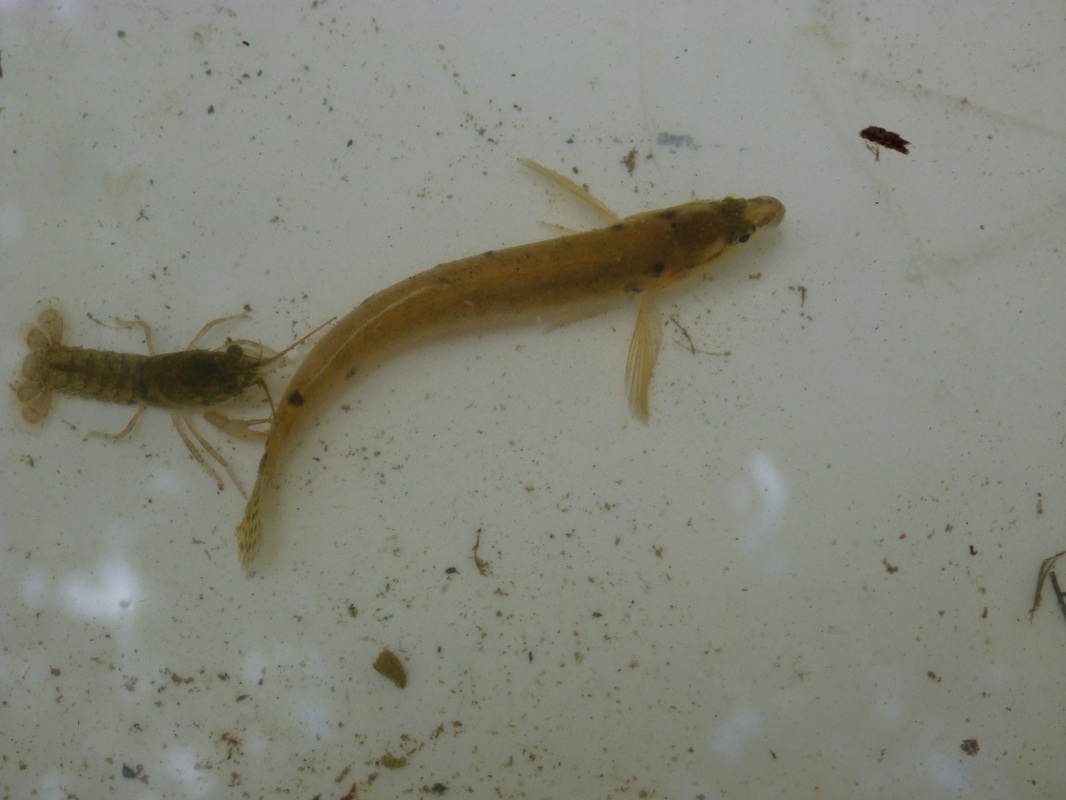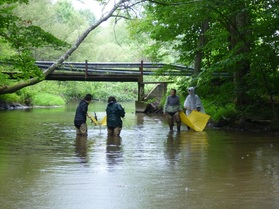Accomplished
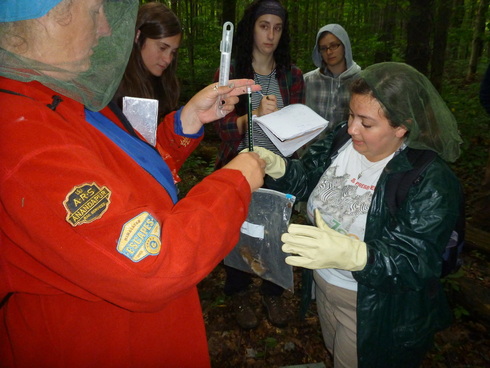
Posted by Lisa Geer (Clarion U.):
I feel accomplished!!! This is our last full day here and although I miss my family terribly, I also feel sad that I won’t get to see my new friends here. All of us working for a common goal, sharing activities and spending a large amount of time together made 3 weeks seem like a short time to bond, but we did.
I sit here writing my last blog in the cafeteria with the smell of homemade cinnamon rolls wafting from the kitchen. It feels like home. Thank you kitchen staff for your ever smiling faces greeting us after a hard day with a delicious home cooked meal! This week went the quickest. We finished up our project research with the help of our class (who knew we would be teaching the small mammal trapping after 3 weeks). Cleaning 156 Sherman traps was definitely not the highlight of my 3 weeks, seeing them packed back into their wooden crates was! It seemed like just yesterday that we were so excited to catch our first, furry, little friend. We are minutes away from finishing our report and tomorrow our presentation. I am excited to see everyone else’s presentations.
The speakers we had every Wednesday gave me insight into the types of research projects that could be my future. They were all very interesting. Dr. Townsend was a great professor, especially when he scored an interpretive tour for us on a pontoon boat at Presque Isle State Park. We saw map turtles, beaver homes, assorted birds, various vegetation and learned so much about the glacial history of the peninsula. We also enjoyed the beach and all its treasures! The visit to the Tom Ridge Environmental Center was exciting too. The observation tower was awesome. What a beautiful sight.
The experience that I have had here at PLE was definitely one of the highlights of my college career. I would like to thank everyone that makes this learning situation possible and if you’re interested in attending Pymatuning Lab of Ecology, but you’re dragging your feet like I was, go for it…definitely an experience you won’t regret!
I feel accomplished!!! This is our last full day here and although I miss my family terribly, I also feel sad that I won’t get to see my new friends here. All of us working for a common goal, sharing activities and spending a large amount of time together made 3 weeks seem like a short time to bond, but we did.
I sit here writing my last blog in the cafeteria with the smell of homemade cinnamon rolls wafting from the kitchen. It feels like home. Thank you kitchen staff for your ever smiling faces greeting us after a hard day with a delicious home cooked meal! This week went the quickest. We finished up our project research with the help of our class (who knew we would be teaching the small mammal trapping after 3 weeks). Cleaning 156 Sherman traps was definitely not the highlight of my 3 weeks, seeing them packed back into their wooden crates was! It seemed like just yesterday that we were so excited to catch our first, furry, little friend. We are minutes away from finishing our report and tomorrow our presentation. I am excited to see everyone else’s presentations.
The speakers we had every Wednesday gave me insight into the types of research projects that could be my future. They were all very interesting. Dr. Townsend was a great professor, especially when he scored an interpretive tour for us on a pontoon boat at Presque Isle State Park. We saw map turtles, beaver homes, assorted birds, various vegetation and learned so much about the glacial history of the peninsula. We also enjoyed the beach and all its treasures! The visit to the Tom Ridge Environmental Center was exciting too. The observation tower was awesome. What a beautiful sight.
The experience that I have had here at PLE was definitely one of the highlights of my college career. I would like to thank everyone that makes this learning situation possible and if you’re interested in attending Pymatuning Lab of Ecology, but you’re dragging your feet like I was, go for it…definitely an experience you won’t regret!
We may not have it all together... but together we have it all
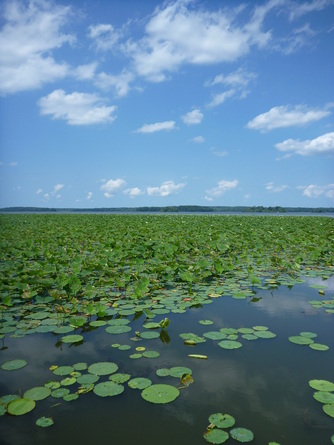
Posted by Tyler Biskup (IUP):
During this week I have found humor where humor lacks most in science. Merely due to the fact that I have had enough of what I have done this past three weeks for the summer. The food was good, the people even better, and the location being the best, I could not have asked for a more rewarding experience. I would like to thank my group members, Noelle, Dean, Emily, Gabby, and AJ for the collective knowledge we all brought to the table. Without them my experience would not have been near to par for what I expect in the future.
As for my adviser and fellow colleagues not mentioned earlier I would also like to thank you. This overall worldliness was not possible without you. I have enjoyed every aspect of my field techniques lab course. Even the cooks brought joy to my day. With that being said Id like to leave you on a high note.
We may not have it all together.... but together we have it all
DON'T MAKE ME LEAVE :(
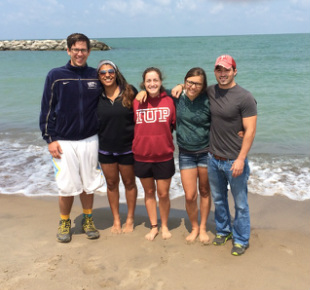
Posted by Emily Williams (IUP):
As week three comes to an end I am beginning to realize just how much I like it here at PLE. Dr. Townsend's class has been a ton of fun and I have honestly learned a lot. I never had any field research experience so it was awesome to be able to go out and learn some new techniques. This course is nice because it is all hands on work and that's how I learn the best, rather than sitting in class learning from a book. I hope that people from IUP ask me about a field study class because I am definitely recommending this course. I have met some great friends here and I am going to miss them for sure. I am so sad! I don't want to leave. Thank goodness some of them go to IUP so I can still see them regularly, as for the others, I will make them come visit me.
We tried to keep ourselves busy when we were not doing school work so we did not get bored. A few activities included; canoeing, swimming, slip n' sliding, bar hopping, sitting around the fire, and playing ping pong in the recreational room. Dr. Townsend also gave us a break this week from doing school work by taking us to Erie; we went to the Tom's Ridge Environmental Center, on a boat tour, and to the beach. It was nice and relaxing to take our minds off the paper due at the end of the week. Thanks Dr. T, you're the best :) Some other stuff we did this week was go help team mammals with their mammal traps. Other than having to get up super early and go check the traps that would have been a cool project to do. After helping team mammals we came back and worked on our paper for the rest of the day. I slowly started to go insane from sitting around on my computer all day and may or may not have carbo loaded on bread from the kitchen at 12am. Worth it. Seriously though, I do not want to leave at all and if I could stay a few more weeks with the people here I have met I would in a heartbeat.
As week three comes to an end I am beginning to realize just how much I like it here at PLE. Dr. Townsend's class has been a ton of fun and I have honestly learned a lot. I never had any field research experience so it was awesome to be able to go out and learn some new techniques. This course is nice because it is all hands on work and that's how I learn the best, rather than sitting in class learning from a book. I hope that people from IUP ask me about a field study class because I am definitely recommending this course. I have met some great friends here and I am going to miss them for sure. I am so sad! I don't want to leave. Thank goodness some of them go to IUP so I can still see them regularly, as for the others, I will make them come visit me.
We tried to keep ourselves busy when we were not doing school work so we did not get bored. A few activities included; canoeing, swimming, slip n' sliding, bar hopping, sitting around the fire, and playing ping pong in the recreational room. Dr. Townsend also gave us a break this week from doing school work by taking us to Erie; we went to the Tom's Ridge Environmental Center, on a boat tour, and to the beach. It was nice and relaxing to take our minds off the paper due at the end of the week. Thanks Dr. T, you're the best :) Some other stuff we did this week was go help team mammals with their mammal traps. Other than having to get up super early and go check the traps that would have been a cool project to do. After helping team mammals we came back and worked on our paper for the rest of the day. I slowly started to go insane from sitting around on my computer all day and may or may not have carbo loaded on bread from the kitchen at 12am. Worth it. Seriously though, I do not want to leave at all and if I could stay a few more weeks with the people here I have met I would in a heartbeat.
Nearing the End
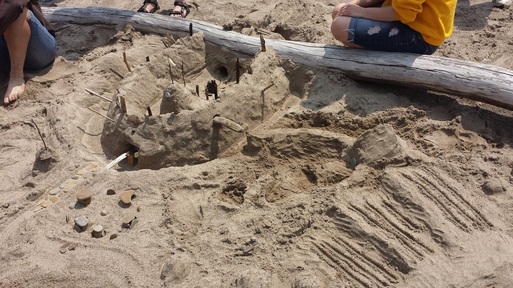
Posted by Dylan Hiles (IUP):
As we quickly approach the end of final week here at PLE, everything is beginning to come to a close. Early in the week, my group mates and I finished identifying and organizing the last of our taxa from Linesville Creek. We also accompanied another group into the field who were catching small mammals in Sherman traps. We helped them record their catches and gather all of their traps on their final day of sampling. After working many hours on our research projects in the past week, we headed north to Presque Isle on Lake Erie on Wednesday for a day of relaxation. We took a pontoon boat tour of the lagoon, as well as visited the Tom Ridge Environmental Center. We also spent some time on the beach of Lake Erie, during which we built a sandcastle and then proceeded to throw small rocks at it until it collapsed back into the sand. We will spend Thursday finishing up our paper and working on our presentation for Friday, then before we know it we will all be back home.
These past couple weeks at PLE have been a lot of fun and also have taught me many things. I hate to think that we will all be leaving soon, but I will also be relieved to finally be finished with our research project. It has been a great experience these past two weeks with getting to be on our own in the field for sampling. There are not many other classes that I have enjoyed as much as this field techniques course here at PLE.
As we quickly approach the end of final week here at PLE, everything is beginning to come to a close. Early in the week, my group mates and I finished identifying and organizing the last of our taxa from Linesville Creek. We also accompanied another group into the field who were catching small mammals in Sherman traps. We helped them record their catches and gather all of their traps on their final day of sampling. After working many hours on our research projects in the past week, we headed north to Presque Isle on Lake Erie on Wednesday for a day of relaxation. We took a pontoon boat tour of the lagoon, as well as visited the Tom Ridge Environmental Center. We also spent some time on the beach of Lake Erie, during which we built a sandcastle and then proceeded to throw small rocks at it until it collapsed back into the sand. We will spend Thursday finishing up our paper and working on our presentation for Friday, then before we know it we will all be back home.
These past couple weeks at PLE have been a lot of fun and also have taught me many things. I hate to think that we will all be leaving soon, but I will also be relieved to finally be finished with our research project. It has been a great experience these past two weeks with getting to be on our own in the field for sampling. There are not many other classes that I have enjoyed as much as this field techniques course here at PLE.
The Finish Line
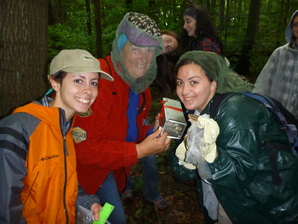
Posted Kayla Weinfurther (IUP):
I can’t believe that the third week of this course is almost over. We’ve accomplished so much during our time here. Our project alone has taught us a lot about the difficulties and rewards that come from field work. 160 Sherman traps were a pain to check every morning, but our results were worth the work. At the beginning of the week we finally collected the last of our data with the help of our classmates, and retrieved our traps. The rest of this week has mostly been dedicated to analyzing our data. On Wednesday we drove to Presque Isle for a day away from the stress of our projects. Some peaceful time by the water was just what we needed. Unfortunately, the time flew by and we’re back to the grind of writing our paper. Although I can’t wait for our project and paper to be finished, I’m sad to see the end of this course. I know that the things I learned here will stay with me for a long time, and I’m thankful to all of the people at PLE who have made my stay here memorable. Hopefully, this won’t be the last I’ve seen of PLE.
I can’t believe that the third week of this course is almost over. We’ve accomplished so much during our time here. Our project alone has taught us a lot about the difficulties and rewards that come from field work. 160 Sherman traps were a pain to check every morning, but our results were worth the work. At the beginning of the week we finally collected the last of our data with the help of our classmates, and retrieved our traps. The rest of this week has mostly been dedicated to analyzing our data. On Wednesday we drove to Presque Isle for a day away from the stress of our projects. Some peaceful time by the water was just what we needed. Unfortunately, the time flew by and we’re back to the grind of writing our paper. Although I can’t wait for our project and paper to be finished, I’m sad to see the end of this course. I know that the things I learned here will stay with me for a long time, and I’m thankful to all of the people at PLE who have made my stay here memorable. Hopefully, this won’t be the last I’ve seen of PLE.
Buh Bye Sherman Traps
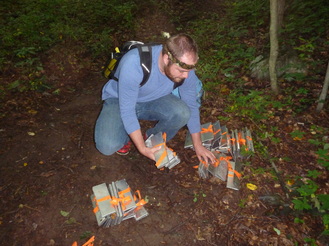
Posted by Carly Simon (Clarion U.):
Today was awesome. I got to sleep in and spend time on the beach! It was a beautiful day for looking for seashells. The view from the top of the Tom Ridge Center and juvenile bald eagle perfected the end of the day. When we arrived back from Erie the group closed all the Sherman traps and put them away. I will be perfectly fine if I do not have to look at another Sherman trap or smell small mammal pee for a while. I am excited to wrap up the paper and presentation tomorrow! These last three weeks have flown but I have learned a lot and am so glad I chose to take this course!
Double-edged Sword
Posted by Simon Adamson (U. Pittsburgh):
One of the most memorable lessons I learned while trudging through a densely packed thorn bush was that waders were one of those double-edged swords I had heard about. For I felt no pain whatsoever as I gently kicked myself a path with which to measure my transect line accurately as a true scientist would. the thick plastic shielding my upper thighs and calfs from the thorns piercing claws. However not a moment later did I step on a jagged rock did I realize the lack of complete support that the waders provided. The bottom of the boots being made entirely of malleable rubber that refused to create a comfortable barrier between the forest floor and my foot. That afternoon I felt every single branch, root, and rock that Black Jack Swamp threw at me.
One of the most memorable lessons I learned while trudging through a densely packed thorn bush was that waders were one of those double-edged swords I had heard about. For I felt no pain whatsoever as I gently kicked myself a path with which to measure my transect line accurately as a true scientist would. the thick plastic shielding my upper thighs and calfs from the thorns piercing claws. However not a moment later did I step on a jagged rock did I realize the lack of complete support that the waders provided. The bottom of the boots being made entirely of malleable rubber that refused to create a comfortable barrier between the forest floor and my foot. That afternoon I felt every single branch, root, and rock that Black Jack Swamp threw at me.
A Tale of Two Streams
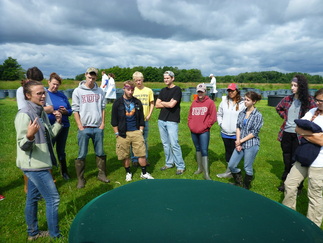
Posted by Cameron Fiss (IUP):
My group is excited to have finally finished identifying every macro invertebrate, salamander, and fish that we found in the Wallace Woods and Tryon-Weber streams. It has been a long couple of days in the lab staring into a microscope or, alternatively, at a computer screen. Some of us became far too familiar with the body structure of different mayfly larvae (family Ephemeridae), while others enjoyed the finer points of data entry. In total we collected and cataloged roughly 50 different macro invertebrates. We also encountered at least three different families of fish and two different salamander genera. Today we took a brief hiatus from stream work and toured the Livingston Lab where we heard all about their many mesocosm experiments. We also got the chance to help the mammal team check their traps. It was interesting to see how they processed mice and chipmunks, the latter of which can be quite feisty. After we travel to Presque Isle tomorrow, we will get a chance to really dig into our data. So far it seems like we can already answer one of our initial questions.
My group is excited to have finally finished identifying every macro invertebrate, salamander, and fish that we found in the Wallace Woods and Tryon-Weber streams. It has been a long couple of days in the lab staring into a microscope or, alternatively, at a computer screen. Some of us became far too familiar with the body structure of different mayfly larvae (family Ephemeridae), while others enjoyed the finer points of data entry. In total we collected and cataloged roughly 50 different macro invertebrates. We also encountered at least three different families of fish and two different salamander genera. Today we took a brief hiatus from stream work and toured the Livingston Lab where we heard all about their many mesocosm experiments. We also got the chance to help the mammal team check their traps. It was interesting to see how they processed mice and chipmunks, the latter of which can be quite feisty. After we travel to Presque Isle tomorrow, we will get a chance to really dig into our data. So far it seems like we can already answer one of our initial questions.
Time Flies!
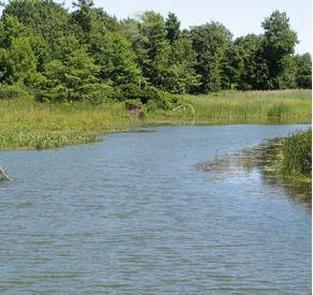
Posted by Stefanie Benvenuto (U. Pittsburgh):
Let me just start by saying that I cannot believe this class is already almost over. I have had so many great memories from these past three weeks that I will never forget. From learning about the field to meeting new friends, this adventure at Pymatuning is one that I will never forget. Although I did not know what I was throwing myself into at first, this course has really allowed me to appreciate field work and the hard work that is put into it on a daily basis. By allowing myself to be out of my comfort zone, it has also taught me a lot about myself and how much I love learning and exploring these new areas of science.
We finished collecting our group project data this Monday and I will admit, it was one of the funniest days that we had out in Blackjack Swamp. With it storming most of the day, all four of us almost slipped and fell at least once while we were collecting data. With screams and laughter all day, it was definitely a good way to end the collection of data before we began to process the data. Our group has really become close these past two weeks and I am really happy that we got placed together for this project!
With this week coming to an end, I am really looking forward to processing our data and presenting our results with the class. I am also looking forward to our trip to Presque Isle tomorrow. I cannot wait to see what the last few days of the class brings.
Let me just start by saying that I cannot believe this class is already almost over. I have had so many great memories from these past three weeks that I will never forget. From learning about the field to meeting new friends, this adventure at Pymatuning is one that I will never forget. Although I did not know what I was throwing myself into at first, this course has really allowed me to appreciate field work and the hard work that is put into it on a daily basis. By allowing myself to be out of my comfort zone, it has also taught me a lot about myself and how much I love learning and exploring these new areas of science.
We finished collecting our group project data this Monday and I will admit, it was one of the funniest days that we had out in Blackjack Swamp. With it storming most of the day, all four of us almost slipped and fell at least once while we were collecting data. With screams and laughter all day, it was definitely a good way to end the collection of data before we began to process the data. Our group has really become close these past two weeks and I am really happy that we got placed together for this project!
With this week coming to an end, I am really looking forward to processing our data and presenting our results with the class. I am also looking forward to our trip to Presque Isle tomorrow. I cannot wait to see what the last few days of the class brings.
New Experiences
Posted by Dean Jepson (U. Pittsburgh):
Have you ever had the opportunity to participate in catching the largest salamander in North America? Well I did, and I must say, it was an amazing once in a lifetime experience. I say once in a lifetime experience because in order to catch this endangered species you must obtain a special license allowing you to legally do so. I had the chance to go out with a team of researchers, and not only experience the capture of these alien looking species, but also see the research being conducted with the organisms. This was the highlight of my time last week, but today I also experienced an exciting time capturing small mammals.
Today I had the chance to see the process of capturing small mammals in Sherman Traps. I had the opportunity to see the several chipmunks up close and see the method for processing them for research. This was another thing, along with the capturing of Hellbenders, that before today, I have never experienced. My time taking the field techniques course at Pymatuning Lake has given me the chance to experience things that I never have before. I can truly say that these past weeks have been eye opening and awe-inspiring time, and I am excited to see what my last week at Pymatuning Lake holds!
Have you ever had the opportunity to participate in catching the largest salamander in North America? Well I did, and I must say, it was an amazing once in a lifetime experience. I say once in a lifetime experience because in order to catch this endangered species you must obtain a special license allowing you to legally do so. I had the chance to go out with a team of researchers, and not only experience the capture of these alien looking species, but also see the research being conducted with the organisms. This was the highlight of my time last week, but today I also experienced an exciting time capturing small mammals.
Today I had the chance to see the process of capturing small mammals in Sherman Traps. I had the opportunity to see the several chipmunks up close and see the method for processing them for research. This was another thing, along with the capturing of Hellbenders, that before today, I have never experienced. My time taking the field techniques course at Pymatuning Lake has given me the chance to experience things that I never have before. I can truly say that these past weeks have been eye opening and awe-inspiring time, and I am excited to see what my last week at Pymatuning Lake holds!
Last Week Adventures
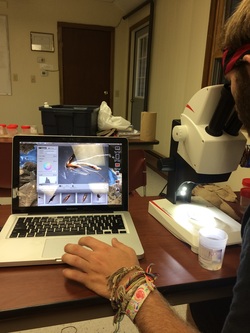
Posted by Noelle Farook (U. Pittsburgh):
So there couldn’t be a better day to write a blog than today. The weekend started off by sampling hellbenders with Tim Hummel and Dr. Kurt Regester. Those lil guys (the hellbenders that is) are pretty darn cute, but on a more serious note, the trip was exceedingly informative; witnessing how a real, long-term, research project plays out is extremely encouraging. The rest of the weekend was filled with cooking… and eating… and all things food related, of course. We also did a lot of class bonding in the form of swimming, slip and sliding in the the rain, bridge jumping, crashing Dr. T’s cabin, playing with an insanely cute german shepherd puppy, and homework OF COURSE!!!! ☺ Just as a shout-out, I wanted to mention how Maddy totally saved our but this week by helping us with our random plot sampling using ArcGIS; she was so busy with her crazy projects, yet still took the time to lend a hand. We truly, truly appreciate it. But the real reason today was the perfect day for blogging was because we had a pretty crazy adventure on the water. We left this morning to collect our last Malaise Trap from Glenn Island 1. Dean and Emily were done their tree sampling from the islands so decided to tag along again and help us out (we are so lucky, without them our project would have been very overwhelming). When we got out on the canoes, it was pouring rain and the waves were choppier than ever. Of course, my lack of balance and coordination didn’t help the situation at all. Yet, after a lot of screaming and back-breaking paddling, we made it there (Dean Bean and Emily are admittedly much faster than we are, we got crushed). The rain stopped as we were collecting the sample, but then obviously started up again on the return trip. We came back, took a quick break, and then all headed to the lab where we finished identifying and cataloguing by dinner time. It was a long day, but we still managed to have a good time doing all our tasks. Once again, I am so happy to have such a supportive group. I think it’s a good lesson about biting off more than you can chew, but more importantly that a good group will help you pull it off even when you do. Hopefully, the rest of the week will go smoothly; the plans include writing the final paper, working on the presentation, and helping any group members that need to finish off their sampling.
So there couldn’t be a better day to write a blog than today. The weekend started off by sampling hellbenders with Tim Hummel and Dr. Kurt Regester. Those lil guys (the hellbenders that is) are pretty darn cute, but on a more serious note, the trip was exceedingly informative; witnessing how a real, long-term, research project plays out is extremely encouraging. The rest of the weekend was filled with cooking… and eating… and all things food related, of course. We also did a lot of class bonding in the form of swimming, slip and sliding in the the rain, bridge jumping, crashing Dr. T’s cabin, playing with an insanely cute german shepherd puppy, and homework OF COURSE!!!! ☺ Just as a shout-out, I wanted to mention how Maddy totally saved our but this week by helping us with our random plot sampling using ArcGIS; she was so busy with her crazy projects, yet still took the time to lend a hand. We truly, truly appreciate it. But the real reason today was the perfect day for blogging was because we had a pretty crazy adventure on the water. We left this morning to collect our last Malaise Trap from Glenn Island 1. Dean and Emily were done their tree sampling from the islands so decided to tag along again and help us out (we are so lucky, without them our project would have been very overwhelming). When we got out on the canoes, it was pouring rain and the waves were choppier than ever. Of course, my lack of balance and coordination didn’t help the situation at all. Yet, after a lot of screaming and back-breaking paddling, we made it there (Dean Bean and Emily are admittedly much faster than we are, we got crushed). The rain stopped as we were collecting the sample, but then obviously started up again on the return trip. We came back, took a quick break, and then all headed to the lab where we finished identifying and cataloguing by dinner time. It was a long day, but we still managed to have a good time doing all our tasks. Once again, I am so happy to have such a supportive group. I think it’s a good lesson about biting off more than you can chew, but more importantly that a good group will help you pull it off even when you do. Hopefully, the rest of the week will go smoothly; the plans include writing the final paper, working on the presentation, and helping any group members that need to finish off their sampling.
The Final Week!
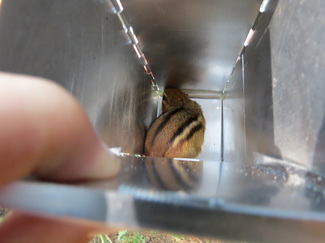
Posted by AJ McCrea (U. Pittsburgh):
This past weekend I stayed here at Pymatuning instead of going home and I had a blast with all my friends. We drove around exploring the local Chinese buffet and ice cream stands on Friday. While on Saturday everyone grilled out or cooked something and we all shared collectively for dinner, I think we all had a great weekend. We are entering the final week of class with our final presentation approaching and I feel we are in a good spot.
Tonight Gabby and I are going to set all of our Sherman traps again for the final time and finish our dip net testing. By tomorrow we will have all of our statics from the processes we chose. We have the majority of our paper done and it mostly needs fine tuning from here. I am excited to head up to Lake Erie for the day tomorrow and get to see something new for a change. I'm sure that there will be less mosquitoes on the beach than here beside the lake. I am still enjoying my time spent here at Pymatuning and looking forward to these next few days here.
This past weekend I stayed here at Pymatuning instead of going home and I had a blast with all my friends. We drove around exploring the local Chinese buffet and ice cream stands on Friday. While on Saturday everyone grilled out or cooked something and we all shared collectively for dinner, I think we all had a great weekend. We are entering the final week of class with our final presentation approaching and I feel we are in a good spot.
Tonight Gabby and I are going to set all of our Sherman traps again for the final time and finish our dip net testing. By tomorrow we will have all of our statics from the processes we chose. We have the majority of our paper done and it mostly needs fine tuning from here. I am excited to head up to Lake Erie for the day tomorrow and get to see something new for a change. I'm sure that there will be less mosquitoes on the beach than here beside the lake. I am still enjoying my time spent here at Pymatuning and looking forward to these next few days here.
Macro-invertebrate Madness!
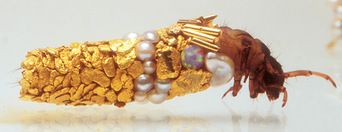
Posted by Skylar King (U. Pittsburgh):
The Stream Team finished sampling last week, and since then we've been trying to organize/analyze our data and identify all the macros we collected. Our twenty little sample jars didn't seem like much. How hard could it be? Apparently, a lot harder than we thought. After sitting in the lab, staring into a microscope for so long, you start to go a little stir crazy. Things sort of just run together, and you miss being outside doing fieldwork.
It isn't all bad, though! Identifying kept us sheltered in the lab and out of the torrential downpour, and the macros themselves are kind of incredible. Their ability to be our "canary in the coal mine" regarding water quality is deserving of respect in itself, but their diversity and sheer numbers are impressive as well. For some reason, I really enjoy stoneflies, but caddisflies might actually be cooler - they make their own little portable houses (cases) out of rock, sand, twigs, etc. However, they'll use what's available to them, as French artist Hubert Duprat showed when he provided caddisfly larvae with gold and jewels to use as their building materials (see accompanying picture!). The results were beautiful, but I think natural caddisfly cases, like spiderwebs or honeycombs, have a certain beauty all their own.
The Stream Team finished sampling last week, and since then we've been trying to organize/analyze our data and identify all the macros we collected. Our twenty little sample jars didn't seem like much. How hard could it be? Apparently, a lot harder than we thought. After sitting in the lab, staring into a microscope for so long, you start to go a little stir crazy. Things sort of just run together, and you miss being outside doing fieldwork.
It isn't all bad, though! Identifying kept us sheltered in the lab and out of the torrential downpour, and the macros themselves are kind of incredible. Their ability to be our "canary in the coal mine" regarding water quality is deserving of respect in itself, but their diversity and sheer numbers are impressive as well. For some reason, I really enjoy stoneflies, but caddisflies might actually be cooler - they make their own little portable houses (cases) out of rock, sand, twigs, etc. However, they'll use what's available to them, as French artist Hubert Duprat showed when he provided caddisfly larvae with gold and jewels to use as their building materials (see accompanying picture!). The results were beautiful, but I think natural caddisfly cases, like spiderwebs or honeycombs, have a certain beauty all their own.
That Chipmunk Weaseled his Way in There...
|
Posted by Scott Stanek (IUP):
No checking traps for mammals today! But t’was a miserable morning when our group realized we didn’t have enough soil to test for all the useful nutrients. We had to trudge out in the rain if we wanted to dry it out in time to write our paper for the end of the week. In the far reaches of our trap grid, I noticed a trap had moved about five meters. I thought, “You don’t even go here!” I picked it up to replace it and it felt heavier than an empty trap should have. And oh sweet baby Jesus, I was scared to find out why. Lo and behold, there was a dead, soaked weasel in the trap. Then a mangled rear end of something fell out too. After screaming, we collected the weasel and other remains and identified our creatures as a long tailed weasel and a little chipmunk booty. Silly creatures. Your guess is as good as mine as to why and how they ended up in that predicament. Anyway, the trip wasn’t a total bust. I was able to find a red-spotted newt out for an adventure through the leaf litter. Then around dinner, we went out to set our traps for one more night of data collection. Tomorrow morning will be easy peasy because the rest of our class will be helping with our biggest site to get some hands on experience trapping small mammals. Maybe if we’re lucky they’ll help us clean them and pack them up again. Here’s hoping. |
Overcoming Obstacles
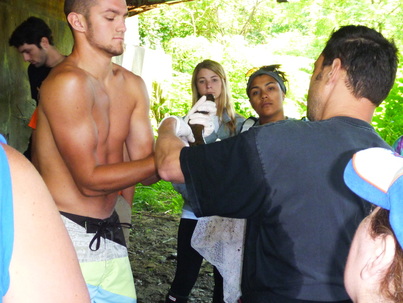
Posted by Stefanie Benvenuto (U. Pittsburgh):
This week was definitely a week full of adventures and obstacles. Our group began our project on the Ash tree population and the possible effects of Eastern Ash Borer in Blackjack swamp. After getting a late start, we jumped right into field work on Wednesday sampling the area. The following day did not go as well as planned however. Shortly after we started, we started to realize that our method was not very precise and we were re sampling the areas we did the previous day. Frustrated, we headed back to fix our method to attempt to be more precise the next day hoping we could get more accurate data! Even though we ran into some obstacles, we kept our heads high and kept working through them. I really find our project interesting even though I would enjoy it so much more if it wasn't for the Mosquitos eating me alive. I've definitely formed a new found hatred for them.
On Friday, we went to French Creek in Meadville looking for Hellbenders! It was definitely a highlight of the week. I have never heard of them before but they were amazing. Their heads looked like a Venus fly trap to me for some reason, super creepy. Can't wait to see what next week brings!
This week was definitely a week full of adventures and obstacles. Our group began our project on the Ash tree population and the possible effects of Eastern Ash Borer in Blackjack swamp. After getting a late start, we jumped right into field work on Wednesday sampling the area. The following day did not go as well as planned however. Shortly after we started, we started to realize that our method was not very precise and we were re sampling the areas we did the previous day. Frustrated, we headed back to fix our method to attempt to be more precise the next day hoping we could get more accurate data! Even though we ran into some obstacles, we kept our heads high and kept working through them. I really find our project interesting even though I would enjoy it so much more if it wasn't for the Mosquitos eating me alive. I've definitely formed a new found hatred for them.
On Friday, we went to French Creek in Meadville looking for Hellbenders! It was definitely a highlight of the week. I have never heard of them before but they were amazing. Their heads looked like a Venus fly trap to me for some reason, super creepy. Can't wait to see what next week brings!
The Best is Yet to Come
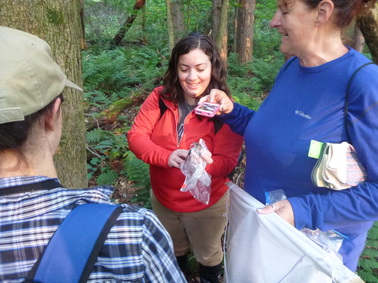
Posted by Lisa Geer (Clarion U.):
This week affirmed my passion for this field. We started our research projects and our group chose small mammals and their habitats. The first day was intense, to say the least. Our plan seemed flawless and well thought out, but even the best thought out plan can have flaws. We planned on setting the traps out on a grid, but as we measured our paths crossed and from there it was history. Our easiest woods took 3 hours to set up. We thought our struggles were over once we set up both sides of Tryon-Weber without a problem, but then we went to the woods behind housing and we struggled through poison ivy, woody debris, multi-floral, mud and the always pesky mosquitos. The next day proved to be rewarding as we caught our specimens and recorded our data. We were disappointed that we lost a shrew and one of our chipmunks was an escape artist. Our team has really blended well and we all seem to enjoy certain tasks, Scott is our soil specialist, Carly is great at keeping data, Kayla flies through the lines finding traps quickly and emptying them efficiently, and Christine is great at handling the escape artists. I really feel that we all can do everything that needs done and everyone works hard and well together as a team.
Enough about our team, PLE has so much to offer. I am really getting a sense of what I would like to do in my career. We are exposed to so many different experiences in three weeks. We went on the lake and learned about sampling, pH, conductivity, transparency testing and so much more. Today was by far the highlight of my week. We went to French Creek and learned how to capture Hellbenders and record all the necessary data. I was having so much fun that I stayed! It was hard work, but I enjoyed it so much it didn’t seem like work. At the beginning of this session I was so overwhelmed, now I can’t believe I only have a week left. I look forward to this week with great anticipation, because I feel the best is yet to come.
This week affirmed my passion for this field. We started our research projects and our group chose small mammals and their habitats. The first day was intense, to say the least. Our plan seemed flawless and well thought out, but even the best thought out plan can have flaws. We planned on setting the traps out on a grid, but as we measured our paths crossed and from there it was history. Our easiest woods took 3 hours to set up. We thought our struggles were over once we set up both sides of Tryon-Weber without a problem, but then we went to the woods behind housing and we struggled through poison ivy, woody debris, multi-floral, mud and the always pesky mosquitos. The next day proved to be rewarding as we caught our specimens and recorded our data. We were disappointed that we lost a shrew and one of our chipmunks was an escape artist. Our team has really blended well and we all seem to enjoy certain tasks, Scott is our soil specialist, Carly is great at keeping data, Kayla flies through the lines finding traps quickly and emptying them efficiently, and Christine is great at handling the escape artists. I really feel that we all can do everything that needs done and everyone works hard and well together as a team.
Enough about our team, PLE has so much to offer. I am really getting a sense of what I would like to do in my career. We are exposed to so many different experiences in three weeks. We went on the lake and learned about sampling, pH, conductivity, transparency testing and so much more. Today was by far the highlight of my week. We went to French Creek and learned how to capture Hellbenders and record all the necessary data. I was having so much fun that I stayed! It was hard work, but I enjoyed it so much it didn’t seem like work. At the beginning of this session I was so overwhelmed, now I can’t believe I only have a week left. I look forward to this week with great anticipation, because I feel the best is yet to come.
The Opposite of Cute and Fuzzy
|
Posted by Kayla Weinfurther (IUP):
How can something so completely opposite of cute and fuzzy be adorable? Maybe it was the heat getting to my head, or perhaps a lack of sleep from an early morning spent trapping, but the first time I looked into a hellbenders beady little eyes, I was hooked. Initially when I found out that we would be doing hellbender sampling, I was a little nervous. I was interested in seeing something completely new to me, but I didn’t know what to expect. I won’t lie; I’ve always been more of a fan of furry little creatures. That’s part of the reason why I wanted to do small mammal trapping for our group project, because I had more experience with them. But there was something so fascinating about those salamanders, possibly because I had never seen anything like them. When we were given the chance to stay and help catch more hellbenders, I couldn’t turn it down. We learned a lot about the work that goes into collecting data from them, and even got to do some of the work ourselves, including measuring their size, weight, and swabbing for disease testing. By the time we finished hours later, I found myself wanting to continue. Of course, I wasn’t the one lifting rocks! I’m glad we were given the opportunity to observe and participate in hellbender sampling, and I hope to get more opportunities to do so in the future. |
Hellbender Adventure
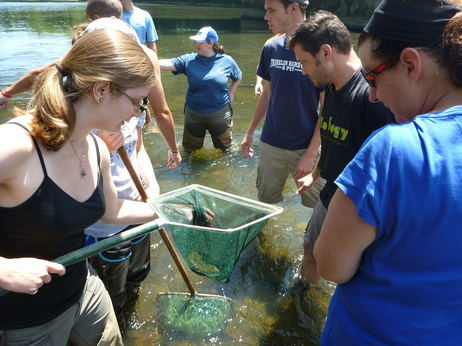
Posted by Emily Szoszorek (U. Pittsburgh):
After the arduous task of identifying macroinvertebrate larvae the previous day, it was nice to take a break and learn about hellbenders today. Cryptobranchus alleganiensis is a fascinating creature. Until now, I was completely unaware such a large salamander lives in Pennsylvania’s streams. Another name for this bead eyed salamander, the snot otter, is apt. Yet despite the hellbenders appearance, this writhing creature of mucous and flesh is charming.
Tim Hummel, a grad student at IUP, gave a wonderful and informative presentation about hellbenders at the lab site, which prepped us for the most exciting part of the day—catching them. Tim, Kurt Regester, a professor at Clarion University, and a couple of Kurt’s students met us at French Creek to demonstrate how to catch hellbenders. When we caught one, they swabbed the hellbenders to test for Chytrid, snipped the tail for DNA testing, measured the length and mass, determined sex, searched for microchips, and tagged those who were not microchipped. Hellbenders are challenging to handle since they are a combination of muscular, slippery, and squirmy. I was able to hold one after Professor Regester and his students were done recording their information. I felt like I was going to lose my grip the whole time. However, the most rewarding part of the day was actually catching hellbender, albeit it was a blind catch.
After the arduous task of identifying macroinvertebrate larvae the previous day, it was nice to take a break and learn about hellbenders today. Cryptobranchus alleganiensis is a fascinating creature. Until now, I was completely unaware such a large salamander lives in Pennsylvania’s streams. Another name for this bead eyed salamander, the snot otter, is apt. Yet despite the hellbenders appearance, this writhing creature of mucous and flesh is charming.
Tim Hummel, a grad student at IUP, gave a wonderful and informative presentation about hellbenders at the lab site, which prepped us for the most exciting part of the day—catching them. Tim, Kurt Regester, a professor at Clarion University, and a couple of Kurt’s students met us at French Creek to demonstrate how to catch hellbenders. When we caught one, they swabbed the hellbenders to test for Chytrid, snipped the tail for DNA testing, measured the length and mass, determined sex, searched for microchips, and tagged those who were not microchipped. Hellbenders are challenging to handle since they are a combination of muscular, slippery, and squirmy. I was able to hold one after Professor Regester and his students were done recording their information. I felt like I was going to lose my grip the whole time. However, the most rewarding part of the day was actually catching hellbender, albeit it was a blind catch.
Two Weeks Down
|
Posted by Dylan Hiles (IUP):
After several long days of work and research, week two at PLE has officially concluded. Being part of the “Stream Team,” my fellow group mates and myself spent many hours over several days in and on many different water bodies around the area. Two days were spent in streams sampling for amphibians, fish and macro invertebrates as part of our research for our group project, another day spent catching hellbenders with the class, and a fourth day spent on pontoon boats on the lake where more samples were gathered as part of a demonstration. After drying off, some time was spent sorting the specimens from the streams we caught into different taxa. Relaxation was greatly welcomed every evening after stuffing ourselves at dinner. Taco night has never been more satisfying than after a long day spent wading through a stream with kick nets and water sampling equipment. I feel as though I’ve learned so much during my time here at PLE, and we’re only two-thirds of the way through. There is still much work for my group to complete for our research project, but I can still feel the end quickly approaching. In my time here I’ve met some great people; professors, researchers and fellow students alike, and every day seems to go by quicker than the last. I look forward to seeing what our third and final week brings, while enjoying the rest of the time I have here. |
A Learning Experience, Humbling, and a Lot of Fun!
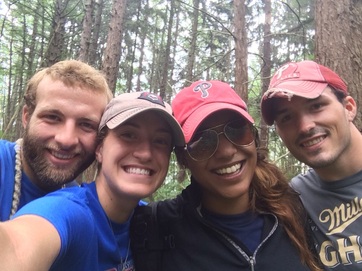
Posted by Noelle Farook (U. Pittsburgh):
Can we just all stop for a second and realize that this course is more than halfway done? For those that have to take this course, or hate being surrounded by nature, or have been forced to share a room with me, that thought is a blessing. But for everyone else, it kind of sucks; this experience has been some crazy mishmash of research, class, work, summer camp, vacation, and boot camp all in one brief three-week course. Its awesome. Don’t get me wrong, this last week has been anything but a walk in the park. But it was a learning experience, it was humbling, and it was a lot of fun. Tyler and I have spent a lot of time together getting comfortable with the canoe, point sampling and malaise traps, crazy insects, and with the never-ending mosquito bites. But we have also spent a lot of time with our other partners, Dean and Emily. They have had their own research to carry out, and their own schedule, yet still made sure they made time to help us out every step of the way. They helped us plot sample one of the islands, and spent the majority of today helping us catalogue and identify our samples. They have single-handedly prevented multiple panic attacks that would have otherwise occurred during the last four days. Of course, my attempt to help them out with their tree sample in return resulted in my partner getting lost in the woods, a massive assault by the unforgiving jagger bushes, Emily tearing out a chunk of my pinky, and some wildly silly pictures. All in all, this project has taught me a lot about working with others as well as giving me a small glimpse as to what future research could turn out to be. Between the lake sampling field trip today, RJ’s presentation last night, and our project that has begun to unfold, I’ve learned more this week than I’ve learned during an entire semester at Pitt.
Can we just all stop for a second and realize that this course is more than halfway done? For those that have to take this course, or hate being surrounded by nature, or have been forced to share a room with me, that thought is a blessing. But for everyone else, it kind of sucks; this experience has been some crazy mishmash of research, class, work, summer camp, vacation, and boot camp all in one brief three-week course. Its awesome. Don’t get me wrong, this last week has been anything but a walk in the park. But it was a learning experience, it was humbling, and it was a lot of fun. Tyler and I have spent a lot of time together getting comfortable with the canoe, point sampling and malaise traps, crazy insects, and with the never-ending mosquito bites. But we have also spent a lot of time with our other partners, Dean and Emily. They have had their own research to carry out, and their own schedule, yet still made sure they made time to help us out every step of the way. They helped us plot sample one of the islands, and spent the majority of today helping us catalogue and identify our samples. They have single-handedly prevented multiple panic attacks that would have otherwise occurred during the last four days. Of course, my attempt to help them out with their tree sample in return resulted in my partner getting lost in the woods, a massive assault by the unforgiving jagger bushes, Emily tearing out a chunk of my pinky, and some wildly silly pictures. All in all, this project has taught me a lot about working with others as well as giving me a small glimpse as to what future research could turn out to be. Between the lake sampling field trip today, RJ’s presentation last night, and our project that has begun to unfold, I’ve learned more this week than I’ve learned during an entire semester at Pitt.
Walking the Trap Lines
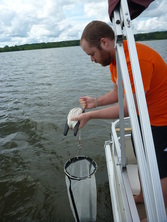
Posted by Scott Stanek (IUP):
This morning we had a great field trip. Brian Pilarcik is a watershed specialist in Crawford County and took us out in the pontoon boats on Pymatuning Lake. He told us about lake turnover and sampling methods in lakes. We got to use some of the instruments for catching zooplankton and measuring plant stuff in the water column. It was so much fun to hang out on the lake for a few hours.
My group project is going wonderful. We are setting traps to catch small rodents in the woods and near human inhabited forested areas. Our goal is to show factors that affect small mammal populations. We set our traps at night and check them early in the morning. After two nights we already have caught numerous mice, chipmunks, and some shrews. We have analyzed our soil, measured the leaf litter, and are currently working on quantifying the canopy cover. While setting our traps tonight, we lost a member in the woods. She missed the trail and took a stroll in the wrong direction. One more night of trapping and then we can analyze the data and start drawing conclusions.
This morning we had a great field trip. Brian Pilarcik is a watershed specialist in Crawford County and took us out in the pontoon boats on Pymatuning Lake. He told us about lake turnover and sampling methods in lakes. We got to use some of the instruments for catching zooplankton and measuring plant stuff in the water column. It was so much fun to hang out on the lake for a few hours.
My group project is going wonderful. We are setting traps to catch small rodents in the woods and near human inhabited forested areas. Our goal is to show factors that affect small mammal populations. We set our traps at night and check them early in the morning. After two nights we already have caught numerous mice, chipmunks, and some shrews. We have analyzed our soil, measured the leaf litter, and are currently working on quantifying the canopy cover. While setting our traps tonight, we lost a member in the woods. She missed the trail and took a stroll in the wrong direction. One more night of trapping and then we can analyze the data and start drawing conclusions.
Island Inverts
Black Jack Swamp Ash
Dean of the Islands
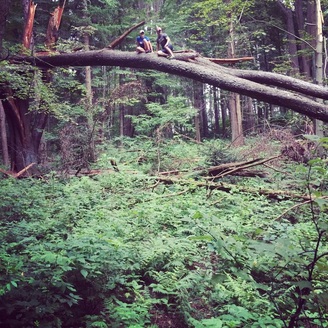
Posted by Emily Williams (IUP):
First things first, before I even start, I just want to say that I do A LOT of work on that canoe! Don't let anyone tell you any different. This week so far has been tons of fun; it is so nice to just go out there on your own and try to do stuff yourself. My partner I are working on the Point-Quarter method and sometimes we, aka Dean, make mistakes, but thank god I'm there to correct them. No, but in all seriousness, we have been learning a multitude of stuff from making mistakes and having to go into further research. For example, we thought we found white spruce today but we had actually found White Pine. We have now gone to all three islands. Today, we went to the farthest island, Whaley, and unfortunately got stuck in a storm. Whaley was by far the easiest island to do research on because it was not completely overgrown with weeds and bushes.
At one point we helped the other group with the insects because we were finished with our stuff for the day. It was super interesting taking a look at what the other groups are doing exactly and what they are finding. I can't wait to see what our data is going to look like when we put it all together! Oh yeah, and Dean really isn't that bad of a partner, I swear.
Taco Night at PLE
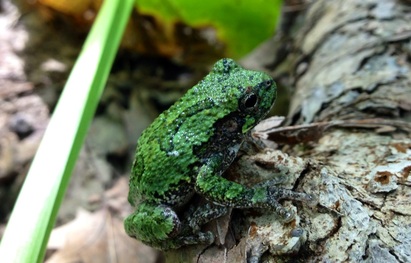
Posted by Cameron Fiss (IUP):
Lets face it; there are few things in life better than an all-you-can-eat taco bar. And while I’m seriously pumped for crunching into that first taco tonight, crunching into our data tomorrow morning is going to be mind-blowing. Our group had a full day; the kind of day that can only end with eating way too many tacos and watching Seinfeld re-runs in the TV room. In all seriousness, the past two days we were able to collect quite a bit of data. We saw a lot of salamanders, fish, and a ton of macro invertebrates. We even found and documented (heavily) a gray tree frog in one of our vegetation plots. Apparently they rarely come down from the canopy, so it’s pretty cool we got to see it. Hopefully, after a lot of macro invertebrate and salamander identification, we can start making sense of our data tomorrow. I think everyone in the group has some ideas as to why we found so many salamanders at Tryon-Weber and so few at Linesville. We will just have to wait and see if the data has some of the answers.
Lets face it; there are few things in life better than an all-you-can-eat taco bar. And while I’m seriously pumped for crunching into that first taco tonight, crunching into our data tomorrow morning is going to be mind-blowing. Our group had a full day; the kind of day that can only end with eating way too many tacos and watching Seinfeld re-runs in the TV room. In all seriousness, the past two days we were able to collect quite a bit of data. We saw a lot of salamanders, fish, and a ton of macro invertebrates. We even found and documented (heavily) a gray tree frog in one of our vegetation plots. Apparently they rarely come down from the canopy, so it’s pretty cool we got to see it. Hopefully, after a lot of macro invertebrate and salamander identification, we can start making sense of our data tomorrow. I think everyone in the group has some ideas as to why we found so many salamanders at Tryon-Weber and so few at Linesville. We will just have to wait and see if the data has some of the answers.
Shrew Success
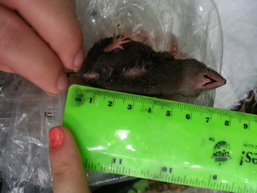
Posted by Kristine Trotta-Hissrich (U. Pittsburgh):
Compared to the past two days today was much less exhausting. We were out checking traps by 6:20 am at the housing site, which is our most daunting site because there are many downed trees and it is like a constant obstacle course to get around. We continue to find mostly mice and occasionally a chipmunk and today we finally caught a shrew! It was great to get something besides a mouse (although the mice are still really cute too). We also finished up with our tree and vegetation survey and started on soil testing. What we didn’t initially realize was that the soil has to be completely dried out and some of the tests need to settle for several hours.
We chose to not set up traps tonight since we have a lecture after dinner and will be on the boats at 9am tomorrow, plus the weather is not great today. We will continue trapping tomorrow evening. I really did not have a good appreciation on how exhausting trapping could be! I am excited to “sleep in” tomorrow.
Compared to the past two days today was much less exhausting. We were out checking traps by 6:20 am at the housing site, which is our most daunting site because there are many downed trees and it is like a constant obstacle course to get around. We continue to find mostly mice and occasionally a chipmunk and today we finally caught a shrew! It was great to get something besides a mouse (although the mice are still really cute too). We also finished up with our tree and vegetation survey and started on soil testing. What we didn’t initially realize was that the soil has to be completely dried out and some of the tests need to settle for several hours.
We chose to not set up traps tonight since we have a lecture after dinner and will be on the boats at 9am tomorrow, plus the weather is not great today. We will continue trapping tomorrow evening. I really did not have a good appreciation on how exhausting trapping could be! I am excited to “sleep in” tomorrow.
Island Mammals
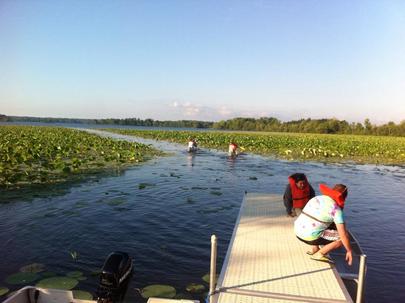
Posted by Andrew McCrea (U. Pittsburgh):
A week and a half through the class and I am still happy with the course. Since we started finding our own research for our project, I have been actually interested in a school project for the first time in awhile. Each morning my partner Gabby and I are searching Sherman traps hoping to find small animals which it always hold suspense. So far we have found two eastern chipmunks and a mouse, both times we have not been able to mark the chipmunk. The first time we could not get the chipmunk out of the trap and the second time we couldn't grip him once in the bag.
The only negative I can think of so far related to this course is my shoulder is starting to hurt from rowing out to the islands. Other than that it has been beautiful out most days, I've made some good friends here and the class is interesting. We started searching for macro-invertebrates today, but it was only on Whaley Island where there was only stagnant water. Tomorrow we plan to search on both the Glenn Islands on the larger one there is a huge pond area which will definitely yield some results. We are going to then collect our findings and view them under a microscope which I am excited to view and identify.
A week and a half through the class and I am still happy with the course. Since we started finding our own research for our project, I have been actually interested in a school project for the first time in awhile. Each morning my partner Gabby and I are searching Sherman traps hoping to find small animals which it always hold suspense. So far we have found two eastern chipmunks and a mouse, both times we have not been able to mark the chipmunk. The first time we could not get the chipmunk out of the trap and the second time we couldn't grip him once in the bag.
The only negative I can think of so far related to this course is my shoulder is starting to hurt from rowing out to the islands. Other than that it has been beautiful out most days, I've made some good friends here and the class is interesting. We started searching for macro-invertebrates today, but it was only on Whaley Island where there was only stagnant water. Tomorrow we plan to search on both the Glenn Islands on the larger one there is a huge pond area which will definitely yield some results. We are going to then collect our findings and view them under a microscope which I am excited to view and identify.
Stream Team, Dream Team
PLE is Full of Surprises
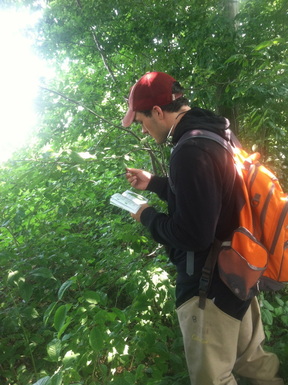
Posted by Dean Jepson (U. Pittsburgh):
Being outside in the woods, collecting bugs, and trailblazing through the brush, has never been high on my list of fun activities. However, over these last couple of days, while conducting my research, I have surprisingly come to the realization that these activities can be enjoyable. Waking up in the morning to a mile canoe ride, to some may be daunting, but for me it is a blast. It allows me to not only get a bit of a tan, but also enables me to grab a small workout before conducting my research.
Upon reaching the island, my tanning session has concluded, and I prepare for battle with the thorn bushes and raspberry bushes, which also contain sizable thorns. I start clothing myself in my armor, which consist of my waders, water bottle, a black hoodie, a hat and sunglasses. Now that I am prepared, I seize my weapons for conducting my research. I grasp my notebook, tree identification field guide, measure tape and my flag markers. I promptly begin my march, with my partner, Emily, into the forest of the unknown, ready to record our findings.
My partner, Emily, and I work great together when out in the field conducting our research. I must say, she is not much help in the canoe, but on dry land, she holds many academic talents. We help each other along the way, and always ensure that the other is collecting the data correctly. Furthermore, when outside doing field research there are always a few surprises that occur, which range from walking face first into large sticky spider webs to accidentally falling into the water. However, today Emily and I had a much nicer surprise. On our way back to PLE we ran into our team members that were going out to conduct their research. Instead of us heading back the PLE to take naps, we tagged along, and I must say, we had the most amazing time. We all shared laughs, bonded over our research and became closer friends. In end, my time conducting research has been somewhat taxing, but moreover, has been a remarkable time.
Being outside in the woods, collecting bugs, and trailblazing through the brush, has never been high on my list of fun activities. However, over these last couple of days, while conducting my research, I have surprisingly come to the realization that these activities can be enjoyable. Waking up in the morning to a mile canoe ride, to some may be daunting, but for me it is a blast. It allows me to not only get a bit of a tan, but also enables me to grab a small workout before conducting my research.
Upon reaching the island, my tanning session has concluded, and I prepare for battle with the thorn bushes and raspberry bushes, which also contain sizable thorns. I start clothing myself in my armor, which consist of my waders, water bottle, a black hoodie, a hat and sunglasses. Now that I am prepared, I seize my weapons for conducting my research. I grasp my notebook, tree identification field guide, measure tape and my flag markers. I promptly begin my march, with my partner, Emily, into the forest of the unknown, ready to record our findings.
My partner, Emily, and I work great together when out in the field conducting our research. I must say, she is not much help in the canoe, but on dry land, she holds many academic talents. We help each other along the way, and always ensure that the other is collecting the data correctly. Furthermore, when outside doing field research there are always a few surprises that occur, which range from walking face first into large sticky spider webs to accidentally falling into the water. However, today Emily and I had a much nicer surprise. On our way back to PLE we ran into our team members that were going out to conduct their research. Instead of us heading back the PLE to take naps, we tagged along, and I must say, we had the most amazing time. We all shared laughs, bonded over our research and became closer friends. In end, my time conducting research has been somewhat taxing, but moreover, has been a remarkable time.
Good Ol' Fashioned Butt Kickin'
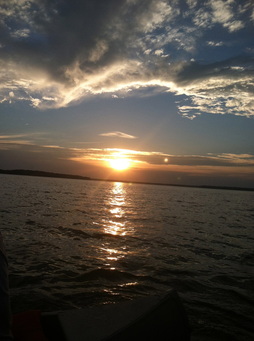
Posted by Gabryel Malone (IUP):
It is now a few days into my experiment and I am freaking exhausted! I think I overestimated my canoeing abilities and now I have realized that I’m actually getting my butt kicked. I try not to complain because I actually really wanted to pursue this super neat experiment plan. And I shouldn’t complain because I get to embark each day, twice a day, on an adventure of my own in hopes to actually catch something cool. But the thing with my particular focus of the group is that satisfaction is not exactly guaranteed. I’m coming to realize that our data could potentially be useless for comparative purposes, thus rendering all of out efforts inconclusive as well as a waste of time.
It’s not all just doom and gloom for me today though because we caught a chipmunk at Whaley! It was a stubborn little guy and wouldn’t come out of the trap until he scurried up the stick we were trying to use to get it in the bag. He jumped like four feet fleeing as fast as we could before being able to mark him. After checking the closest islands Glenn 1 and 2, I was really bummed out to find all of our traps to be empty. I know that there might not even be vertebrates at Glenn 2 because of its small size. It would also mean that the bones that we found there were just brought over by the eagles or other bird species. The birds could have picked them off as well. Maybe there were even decent sized populations of small mammals there previously. Eh, but maybe not, I’m not sure. All that I do know is that I am very hopeful for tomorrow to see if anything found its way into our traps. Along with checking our traps tomorrow we will be trudging around in all of the swampy areas of the islands to try and scoop up some macroinvertebrates. So that’s another thing to look forward to as I try and forget that I have one long and sore canoe trip ahead of me.
It is now a few days into my experiment and I am freaking exhausted! I think I overestimated my canoeing abilities and now I have realized that I’m actually getting my butt kicked. I try not to complain because I actually really wanted to pursue this super neat experiment plan. And I shouldn’t complain because I get to embark each day, twice a day, on an adventure of my own in hopes to actually catch something cool. But the thing with my particular focus of the group is that satisfaction is not exactly guaranteed. I’m coming to realize that our data could potentially be useless for comparative purposes, thus rendering all of out efforts inconclusive as well as a waste of time.
It’s not all just doom and gloom for me today though because we caught a chipmunk at Whaley! It was a stubborn little guy and wouldn’t come out of the trap until he scurried up the stick we were trying to use to get it in the bag. He jumped like four feet fleeing as fast as we could before being able to mark him. After checking the closest islands Glenn 1 and 2, I was really bummed out to find all of our traps to be empty. I know that there might not even be vertebrates at Glenn 2 because of its small size. It would also mean that the bones that we found there were just brought over by the eagles or other bird species. The birds could have picked them off as well. Maybe there were even decent sized populations of small mammals there previously. Eh, but maybe not, I’m not sure. All that I do know is that I am very hopeful for tomorrow to see if anything found its way into our traps. Along with checking our traps tomorrow we will be trudging around in all of the swampy areas of the islands to try and scoop up some macroinvertebrates. So that’s another thing to look forward to as I try and forget that I have one long and sore canoe trip ahead of me.
Fishery Interests
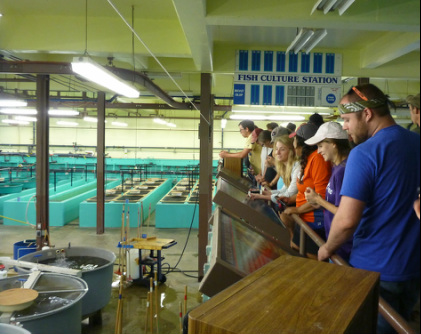
Posted by Maddy Kelley (U. Pittsburgh):
Last week we got some great experience with different techniques. The point quarter method in Tryon Weber Woods went great, except for swarming mosquitos. The next day we did some stream work, which has always been one of my favorites. We saw a lot of differences between the two sites. The Linesville creek, which was much larger, seemed to have no salamanders (though this could have been due to a fault in our survey techniques). On Friday we went to the local fish hatchery. I am always amazed when I go there. I think this was my 4th time there and the atmosphere was much more laid back, typical day at the office, than my last trip on their Open House Day.
I’m never able to wrap my head around all the work that the fish hatchery does. When I think of fishing I think of it as a relaxing way to connect with nature. After hearing how the hatchery is responsible for raising so many fish and keeping fishing a fun and widespread sport; it makes me question how natural fishing is today.
I think I would enjoy working with the fishery. It seems if they had more resources available a lot more could be done. I think a great project would be helping understand their stock population genetics. Since they are sending fish across the state it is important to understand the genes spreading into the wild populations.
Last week we got some great experience with different techniques. The point quarter method in Tryon Weber Woods went great, except for swarming mosquitos. The next day we did some stream work, which has always been one of my favorites. We saw a lot of differences between the two sites. The Linesville creek, which was much larger, seemed to have no salamanders (though this could have been due to a fault in our survey techniques). On Friday we went to the local fish hatchery. I am always amazed when I go there. I think this was my 4th time there and the atmosphere was much more laid back, typical day at the office, than my last trip on their Open House Day.
I’m never able to wrap my head around all the work that the fish hatchery does. When I think of fishing I think of it as a relaxing way to connect with nature. After hearing how the hatchery is responsible for raising so many fish and keeping fishing a fun and widespread sport; it makes me question how natural fishing is today.
I think I would enjoy working with the fishery. It seems if they had more resources available a lot more could be done. I think a great project would be helping understand their stock population genetics. Since they are sending fish across the state it is important to understand the genes spreading into the wild populations.
Mouse... Mouse... Mouse... Chipmunk!
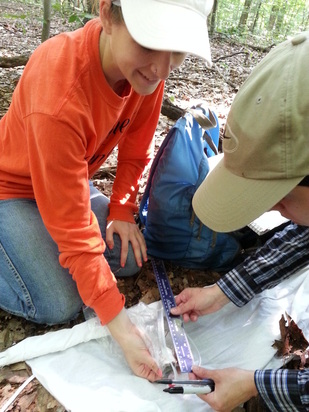
Posted by Carly Moore (Clarion U.):
It has been so great to finally start our group projects! After a little struggle getting started Monday afternoon, my group came together and got the process down to set the Sherman Traps easily. After finally getting to check traps and see the little creatures we caught this morning I’m excited to see what else we can lure in! Today we only got a few chipmunks and about a dozen mice from the four locations, but I’m hopeful other species will come a munchin’. Not one small mammal was trapped at Sanctuary Lake! I was surprised we didn’t get a single one with those traps, maybe it was because it was less shaded. We did have a deer charge through while we were checking though! We also surveyed insects and vegetation at three of the sites so each day from today should only get easier.
Streaming Live
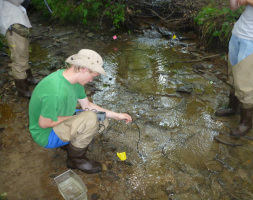
Posted by Ian Anderson (IUP):
Entering the second week at Pymatuning my group (the Stream Team Dream Team) began our project. We are attempting to document and account for the differences in stream organisms in two streams near Linesville. Day One of field work was an exhausting but extremely interesting experience. We caught about 40 salamanders and (as of yet) uncounted macro inverts in the smaller of the two streams. Our kick netting scheme seems to be paying off and tomorrow we will be doing the same at the larger of the two streams. The stream is significantly different and we are all hoping we will have the same success we had today (minus the feast we provided for the mosquitoes).
Entering the second week at Pymatuning my group (the Stream Team Dream Team) began our project. We are attempting to document and account for the differences in stream organisms in two streams near Linesville. Day One of field work was an exhausting but extremely interesting experience. We caught about 40 salamanders and (as of yet) uncounted macro inverts in the smaller of the two streams. Our kick netting scheme seems to be paying off and tomorrow we will be doing the same at the larger of the two streams. The stream is significantly different and we are all hoping we will have the same success we had today (minus the feast we provided for the mosquitoes).
A Trek into the Unknown with New Friends
Posted by Simon Adamson (U. Pittsburgh):
My first week at PLE was a great deal of fun and got me very interested in the field techniques of conservation ecology. One of the most memorable things we did last week was visit the hatchery, where we got to see millions of fish being raised for future human entertainment. It was interesting to see how a skill like fishing that was used to hunt food 100 years ago has turned into a giant business where the demand far exceeds the supply. It reminded of the scene from The Matrix where Neo wakes up and sees a farm of humans being grown for food.
One of the most rewarding experiences from last week was going into Tryon Weber Woods and doing the aquatic invertebrate surveys using nets. I caught a huge craw-fish after finding him hiding underneath a huge rock. But what was more fun was getting to explore the area with some new friends while laughing and having fun along the way. We ended up getting distracted and spending too much time looking for interesting things in the water that we showed up late to Dr. T’s discussion about what we found. All in all it was a really fun week.
My first week at PLE was a great deal of fun and got me very interested in the field techniques of conservation ecology. One of the most memorable things we did last week was visit the hatchery, where we got to see millions of fish being raised for future human entertainment. It was interesting to see how a skill like fishing that was used to hunt food 100 years ago has turned into a giant business where the demand far exceeds the supply. It reminded of the scene from The Matrix where Neo wakes up and sees a farm of humans being grown for food.
One of the most rewarding experiences from last week was going into Tryon Weber Woods and doing the aquatic invertebrate surveys using nets. I caught a huge craw-fish after finding him hiding underneath a huge rock. But what was more fun was getting to explore the area with some new friends while laughing and having fun along the way. We ended up getting distracted and spending too much time looking for interesting things in the water that we showed up late to Dr. T’s discussion about what we found. All in all it was a really fun week.
I am the Happiest of Campers
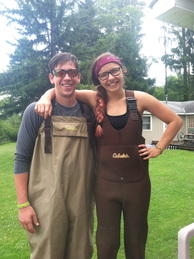
Posted by Gabby Malone (IUP):
First week down and I am convinced that I am already the happiest of the campers here. I don’t think that anything beats the time that I have already spent here. Being able to play outside all day every day is basically exactly what I needed out of this experience. I have really enjoyed how laid back the classes are and how much fun I have rooting around in the forest for most of the day. The best part of my week was going out to both of the sites to do dip net testing in the streams. I completely immersed myself in the task by taking off my shoes with AJ and squished around in the mud. It was so satisfying to be able to catch so many different species that day and actually be able to classify them with my handy dandy pond life field guide. Lame, I know but I have truly been having way too much fun here. The atmosphere and everyone here is just a perfect recipe for a great time. I have become weirdly so close with my lab group and didn’t actually think that I would miss those crazies over the weekend but I did. I am so stoked for these next few weeks unfold and to start our experiment. I really enjoy the whole idea of having full control of exactly how you want the experiment to be. Being able to have the freedom to use the islands as our focus area and canoe out there every day is awesome. Moral of the story is that I couldn’t be happier right now considering that I am in a summer course.
First week down and I am convinced that I am already the happiest of the campers here. I don’t think that anything beats the time that I have already spent here. Being able to play outside all day every day is basically exactly what I needed out of this experience. I have really enjoyed how laid back the classes are and how much fun I have rooting around in the forest for most of the day. The best part of my week was going out to both of the sites to do dip net testing in the streams. I completely immersed myself in the task by taking off my shoes with AJ and squished around in the mud. It was so satisfying to be able to catch so many different species that day and actually be able to classify them with my handy dandy pond life field guide. Lame, I know but I have truly been having way too much fun here. The atmosphere and everyone here is just a perfect recipe for a great time. I have become weirdly so close with my lab group and didn’t actually think that I would miss those crazies over the weekend but I did. I am so stoked for these next few weeks unfold and to start our experiment. I really enjoy the whole idea of having full control of exactly how you want the experiment to be. Being able to have the freedom to use the islands as our focus area and canoe out there every day is awesome. Moral of the story is that I couldn’t be happier right now considering that I am in a summer course.
Reflection and Anticipation
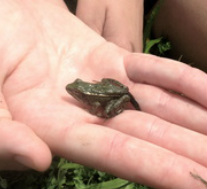
Posted by Skylar King (U. Pittsburgh):
I started out pretty anxious about this class. It all seemed a little daunting: meeting so many new people at once, having to be with them all almost 24/7, coming up with/carrying out our own field research project (where would we even get an idea for a project? what would my group be like?). After the introductions on the very first day, though, I started to feel better. Even though most of us come from different backgrounds, are on different paths, etc., we're all here together now, and we share at least our common interest in the outdoors. As for our project, it turns out I didn't have to worry - the idea sort of just presented itself to us, and my group is fantastic.
Now, I'm just anxious to do more fieldwork! I'm not too excited to have a million more mosquitos biting my face, but I think I love being in the woods enough to just grin and bear it. The day we spent wading in the streams, using Surber samplers and kick nets to catch frogs, salamanders, and leggy little aquatic insects was my favorite so far, so I’m glad our project will allow me to do more of that. It’s been interesting planning for the project and gathering background information on these amphibians and macroinvertebrates, but I can definitely say that I’m glad we’ll be getting back into the field soon.
I started out pretty anxious about this class. It all seemed a little daunting: meeting so many new people at once, having to be with them all almost 24/7, coming up with/carrying out our own field research project (where would we even get an idea for a project? what would my group be like?). After the introductions on the very first day, though, I started to feel better. Even though most of us come from different backgrounds, are on different paths, etc., we're all here together now, and we share at least our common interest in the outdoors. As for our project, it turns out I didn't have to worry - the idea sort of just presented itself to us, and my group is fantastic.
Now, I'm just anxious to do more fieldwork! I'm not too excited to have a million more mosquitos biting my face, but I think I love being in the woods enough to just grin and bear it. The day we spent wading in the streams, using Surber samplers and kick nets to catch frogs, salamanders, and leggy little aquatic insects was my favorite so far, so I’m glad our project will allow me to do more of that. It’s been interesting planning for the project and gathering background information on these amphibians and macroinvertebrates, but I can definitely say that I’m glad we’ll be getting back into the field soon.
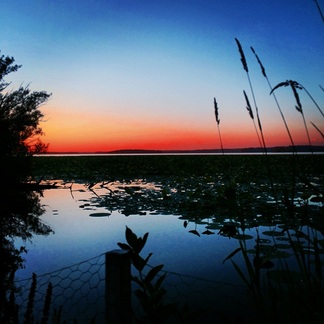
Posted by Noelle Farook (U. Pittsburgh):
So week one highlights: Canoeing with some spectacular young individuals, visiting the fish hatchery, dip-net sampling and finding some pretty rad fishies and crayfish, perfectly on-point dinners made by the lovely ladies at PLE, and learning a lot about group work and ecological sampling methods. I think the most notable theme for the week, personally, was that everything we did sparked some sort of idea for a research project in my head. I noticed this particularly at the fish hatchery when we talked to the director about the issues that the Linesville State Fish Hatchery faces. They don’t seem to have a lot of financial support when dealing with problems and research questions they have; exploring these would most definitely benefit the future of the hatchery. Unfortunately, I’m pretty sure I am not qualified to head a research project on that level. One day…. On a different note, our research group has decided to focus on sampling from three islands, which involves an extensive amount of canoeing. I’ve decided to opt out of the every-day early morning run and maybe just do it every other day? :/ My group within the larger group is sampling arthropods, which I’m pretty stoked about. I was kind of hoping to just focus on moths for my project but realized that it wouldn’t pan out to be a comprehensive project in the time we have, and also it isn’t something that everyone would be interested in. Moral? I’m learning to compromise… (baby steps!) I’m still finding cool moths around the housing sites and classroom. We will be very busy with our project but I have faith in us, we have an appointed group leader who is really amazing at keeping us on task; turns out he’s the only one who doesn’t have a major related to ecology and conservation, he’s going to be a dentist… WE LOVE HIM! We are all taking on our own tasks dependent on our interests; its going to be preeeetty amazing. Overall all, a good week. I have high expectations for next week: get work done, learn new techniques, work together with my group, sleep more, eat good food, avoid annoying Dr. Townsend, find some cool invertebrates and arthropods, take advantage of the beautiful site we have here!
So week one highlights: Canoeing with some spectacular young individuals, visiting the fish hatchery, dip-net sampling and finding some pretty rad fishies and crayfish, perfectly on-point dinners made by the lovely ladies at PLE, and learning a lot about group work and ecological sampling methods. I think the most notable theme for the week, personally, was that everything we did sparked some sort of idea for a research project in my head. I noticed this particularly at the fish hatchery when we talked to the director about the issues that the Linesville State Fish Hatchery faces. They don’t seem to have a lot of financial support when dealing with problems and research questions they have; exploring these would most definitely benefit the future of the hatchery. Unfortunately, I’m pretty sure I am not qualified to head a research project on that level. One day…. On a different note, our research group has decided to focus on sampling from three islands, which involves an extensive amount of canoeing. I’ve decided to opt out of the every-day early morning run and maybe just do it every other day? :/ My group within the larger group is sampling arthropods, which I’m pretty stoked about. I was kind of hoping to just focus on moths for my project but realized that it wouldn’t pan out to be a comprehensive project in the time we have, and also it isn’t something that everyone would be interested in. Moral? I’m learning to compromise… (baby steps!) I’m still finding cool moths around the housing sites and classroom. We will be very busy with our project but I have faith in us, we have an appointed group leader who is really amazing at keeping us on task; turns out he’s the only one who doesn’t have a major related to ecology and conservation, he’s going to be a dentist… WE LOVE HIM! We are all taking on our own tasks dependent on our interests; its going to be preeeetty amazing. Overall all, a good week. I have high expectations for next week: get work done, learn new techniques, work together with my group, sleep more, eat good food, avoid annoying Dr. Townsend, find some cool invertebrates and arthropods, take advantage of the beautiful site we have here!
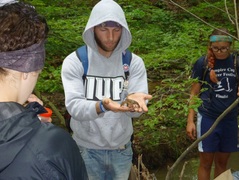
Posted by Tyler Biskup (IUP):
During my first week I meet some incredible people and made some even better memories. I took what I learned from point quarter method and dip sampling and added it to my arsenal of techniques. The creeks were pretty fun, to go to get a good idea of an ecosystem and how it functions. The knowledge I gained there I feel could be used throughout life and my research.
Besides increasing my technique around creeks I also got a chance to travel to several islands. On these islands I was able to explore and collect data that may be useful later on down the road. This gave me a good overview of what I may be getting myself into when I am older. So far everything is going great and I would love to keep it that way. The people, experiences, and professors are amazing and none of it would be possible without any of them.
During my first week I meet some incredible people and made some even better memories. I took what I learned from point quarter method and dip sampling and added it to my arsenal of techniques. The creeks were pretty fun, to go to get a good idea of an ecosystem and how it functions. The knowledge I gained there I feel could be used throughout life and my research.
Besides increasing my technique around creeks I also got a chance to travel to several islands. On these islands I was able to explore and collect data that may be useful later on down the road. This gave me a good overview of what I may be getting myself into when I am older. So far everything is going great and I would love to keep it that way. The people, experiences, and professors are amazing and none of it would be possible without any of them.
A Second Home and Sentiments
Posted by Emily Szoszorek (U. Pittsburgh):
I remember feeling so nervous the night before I left Pittsburgh to stay here. I did not know what to expect. That anxiety has completely vanished; now this place feels like a second home. The first night, when we all were sitting around the campfire, nearly everyone said they planned on going home for the weekend. It would surprise me if the majority of my fellow classmates plan on doing the same thing again this weekend.
Studying in an active, hands-on course instead of inside a lecture hall is a refreshing breath of air. We could have easily talked about point quarter method or how to use a surber sampler but it is far more rewarding to experience these sample methods on the field. Practicing what I have learned in theory satisfies a sense of wanderlust. I get sentimental whenever I am on the field with a surber sampler or kick net searching for creepy-crawlies under streambed rocks. It reminds me of my childhood days where I enjoyed finding potato bugs and slugs underneath my neighbor’s rocks and would sit hours in the Allegheny River watching the minnows swim around my feet. My curiosity and compassion for the natural world brought me to major in environmental studies. Yet, my studies have secluded me from much of nature. Being out on the field rekindles my love for the outdoors—an ability a lecture hall lacks. I am even starting to get used to the mosquitoes. After a long week of learning sampling techniques and preparing for our project proposal, I am excited to finally start our project on Monday.
I remember feeling so nervous the night before I left Pittsburgh to stay here. I did not know what to expect. That anxiety has completely vanished; now this place feels like a second home. The first night, when we all were sitting around the campfire, nearly everyone said they planned on going home for the weekend. It would surprise me if the majority of my fellow classmates plan on doing the same thing again this weekend.
Studying in an active, hands-on course instead of inside a lecture hall is a refreshing breath of air. We could have easily talked about point quarter method or how to use a surber sampler but it is far more rewarding to experience these sample methods on the field. Practicing what I have learned in theory satisfies a sense of wanderlust. I get sentimental whenever I am on the field with a surber sampler or kick net searching for creepy-crawlies under streambed rocks. It reminds me of my childhood days where I enjoyed finding potato bugs and slugs underneath my neighbor’s rocks and would sit hours in the Allegheny River watching the minnows swim around my feet. My curiosity and compassion for the natural world brought me to major in environmental studies. Yet, my studies have secluded me from much of nature. Being out on the field rekindles my love for the outdoors—an ability a lecture hall lacks. I am even starting to get used to the mosquitoes. After a long week of learning sampling techniques and preparing for our project proposal, I am excited to finally start our project on Monday.
A Week of Firsts
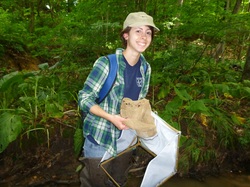
Posted by Kayla Weinfurther (IUP):
At the end of the first week of this course, I have to say I’ve never had this much fun in class! This was my very first experience doing field work, and despite being harassed daily by hoards of mosquitoes, I’ve made it out alive. I learned a lot in the past few days, including a few field techniques that will come in handy for my groups’ project. This project marks another first for me because we have been given the opportunity to form and run our own field study based on what we are interested in working on. We will be looking at small mammal diversity in Pymatuning State Park, and will be learning how to trap them for our study. Everyone in my group is equally excited to get out in the field to collect data. Monday can’t come soon enough.
At the end of the first week of this course, I have to say I’ve never had this much fun in class! This was my very first experience doing field work, and despite being harassed daily by hoards of mosquitoes, I’ve made it out alive. I learned a lot in the past few days, including a few field techniques that will come in handy for my groups’ project. This project marks another first for me because we have been given the opportunity to form and run our own field study based on what we are interested in working on. We will be looking at small mammal diversity in Pymatuning State Park, and will be learning how to trap them for our study. Everyone in my group is equally excited to get out in the field to collect data. Monday can’t come soon enough.
Rise of the Stream Team
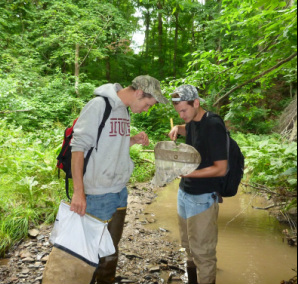
Posted by Cameron Fiss (IUP):
Week one seemed to fly by as we experienced much of the joys the field has to offer. We learned stream sampling techniques and the point quarter method (hard to beat a day identifying and measuring trees), not to mention we got to start designing our own projects. Our group will be putting our new skills to the test next week when we begin sampling for our stream-based project. As we spent the past week wading through the Linesville and Tryon-Weber streams pulling out salamanders and a multitude of macro invertebrates, our team started to develop. Perhaps more importantly though, we began to develop questions about the state of the two streams and their discernible differences. It was clear to us that as class, we had collected what seemed like a substantially larger amount of amphibians, specifically salamanders, from the Tryon-Weber stream than the Linesville stream. Was the difference due to water quality, or perhaps habitat around the stream? With the Stream Team assembled from students of different universities and different interests and backgrounds, we hope to draw some interesting results from our study.
Posted by Dylan Hiles (IUP):
The first full week at PLE kept everyone very busy. After getting familiar with the facility, we began the week with learning some basic techniques for sampling streams, such as using kick nets and surber samplers. We first talked briefly about our approach in the classroom before heading out into the field to get some hands on experience. After sampling two different streams, we observed a notable difference in the number of amphibians between the two sites. This not only intrigued myself, but a few other students as well. A few days later, these students and myself decided to team up in order to investigate this phenomena as the subject of our research project. It also helped that we enjoyed the previous days spent in the streams when it came time to decide to make this the center of our research. After spending the better part of Thursday and Friday doing research and working on a proposal, the weekend was happily welcomed before we presented our project proposal Monday morning then went into the field to begin gathering data.
Week one seemed to fly by as we experienced much of the joys the field has to offer. We learned stream sampling techniques and the point quarter method (hard to beat a day identifying and measuring trees), not to mention we got to start designing our own projects. Our group will be putting our new skills to the test next week when we begin sampling for our stream-based project. As we spent the past week wading through the Linesville and Tryon-Weber streams pulling out salamanders and a multitude of macro invertebrates, our team started to develop. Perhaps more importantly though, we began to develop questions about the state of the two streams and their discernible differences. It was clear to us that as class, we had collected what seemed like a substantially larger amount of amphibians, specifically salamanders, from the Tryon-Weber stream than the Linesville stream. Was the difference due to water quality, or perhaps habitat around the stream? With the Stream Team assembled from students of different universities and different interests and backgrounds, we hope to draw some interesting results from our study.
Posted by Dylan Hiles (IUP):
The first full week at PLE kept everyone very busy. After getting familiar with the facility, we began the week with learning some basic techniques for sampling streams, such as using kick nets and surber samplers. We first talked briefly about our approach in the classroom before heading out into the field to get some hands on experience. After sampling two different streams, we observed a notable difference in the number of amphibians between the two sites. This not only intrigued myself, but a few other students as well. A few days later, these students and myself decided to team up in order to investigate this phenomena as the subject of our research project. It also helped that we enjoyed the previous days spent in the streams when it came time to decide to make this the center of our research. After spending the better part of Thursday and Friday doing research and working on a proposal, the weekend was happily welcomed before we presented our project proposal Monday morning then went into the field to begin gathering data.
Skulpin Excitement
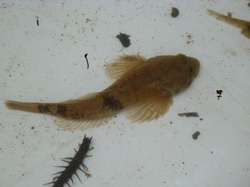
Posted by Lisa Geer (Clarion U.):
Today I feel confident after a week of honing my skills with Point-Quarter Method, Transect and Plot Sampling, collecting aquatic invertebrates, herps and fish. It was a fun and exciting week! My love of environmental biology was reinforced as the week progressed.
The highlight of my week was catching the Mottled Sculpin and coming back to the lab to research him/her. I enjoy the company of the other students and their love of nature. Our research group was formed by mutual interest of small mammals and curiosity of their surrounding habitats and the effects on them. This week should prove to be exciting also as we work together as “real scientisits”.
Today I feel confident after a week of honing my skills with Point-Quarter Method, Transect and Plot Sampling, collecting aquatic invertebrates, herps and fish. It was a fun and exciting week! My love of environmental biology was reinforced as the week progressed.
The highlight of my week was catching the Mottled Sculpin and coming back to the lab to research him/her. I enjoy the company of the other students and their love of nature. Our research group was formed by mutual interest of small mammals and curiosity of their surrounding habitats and the effects on them. This week should prove to be exciting also as we work together as “real scientisits”.
You Only PLE Once...
Posted by Emily Williams (IUP):
I just want to start off by saying just how much fun I’m having! Everyday we have basically spent our time out in the field. The first day we spent a little time in the classroom but then went right out in the field to start different field techniques. The first thing we learned was how to identify animals and plants. We had to find several different kinds of species and identify them when we got home. This would have been cooler if I would have found some kind of mammal to work on but unfortunately I did not. Boo! No fun. The next two days we continued some field techniques with Point-Quarter method and learning how to collect animals out of the water with different methods. All of these techniques are actually really going to come in handy because we are using them for our research project starting next week. I am SUPER excited to start our research project.
I think it’s going to be a lot of fun and it’s nice that we get to break up into our own groups and do our own work. Our research is taking place on the islands which means a lot of canoeing for the next week and a half. This is okay with me because I love canoeing and I’m going to be RIPPED. Just kidding, I’m definitely going to try to make my canoe partner, Dean, do 90% of the rowing while I just sit there. We’ll see how that goes… On that note, I’ve made friends with mostly all of the people here at PLE. Some may or not hate me, including Dr. Townsend, because I’m obnoxious but that’s okay because I will force them to be friends with me whether they like it or not. I didn’t honestly think I’d make such good friends with the people here! I’ve only been here a week and I swear I’ve known a few of the kids all my life. Woot woot! I can’t wait for the next two weeks!
I just want to start off by saying just how much fun I’m having! Everyday we have basically spent our time out in the field. The first day we spent a little time in the classroom but then went right out in the field to start different field techniques. The first thing we learned was how to identify animals and plants. We had to find several different kinds of species and identify them when we got home. This would have been cooler if I would have found some kind of mammal to work on but unfortunately I did not. Boo! No fun. The next two days we continued some field techniques with Point-Quarter method and learning how to collect animals out of the water with different methods. All of these techniques are actually really going to come in handy because we are using them for our research project starting next week. I am SUPER excited to start our research project.
I think it’s going to be a lot of fun and it’s nice that we get to break up into our own groups and do our own work. Our research is taking place on the islands which means a lot of canoeing for the next week and a half. This is okay with me because I love canoeing and I’m going to be RIPPED. Just kidding, I’m definitely going to try to make my canoe partner, Dean, do 90% of the rowing while I just sit there. We’ll see how that goes… On that note, I’ve made friends with mostly all of the people here at PLE. Some may or not hate me, including Dr. Townsend, because I’m obnoxious but that’s okay because I will force them to be friends with me whether they like it or not. I didn’t honestly think I’d make such good friends with the people here! I’ve only been here a week and I swear I’ve known a few of the kids all my life. Woot woot! I can’t wait for the next two weeks!
Diving In
Posted by Stefanie Benvenuto (U. Pittsburgh):
After completing the first week of class at Pymatuning, it left me extremely excited and looking forward for the next two weeks. Besides the fact of getting bitten alive by the mosquitos in the Tryon Weber Woods, I really enjoyed all of the field techniques that we learned over the course of the first week including the point quarter method and stream sampling. Both of these techniques I feel will benefit me greatly as we continue this course. I especially enjoyed the stream sampling and looking for different aquatic animals in the stream including crayfish, salamanders, fish and frogs. I thought it was interesting that there were such vast differences among the two sites that we sampled from.
I was nervous at first when I found out that we would have to put together our own group project because I do not have much experience with these subjects. However, once we began doing stream sampling, I knew that I wanted to do a project dealing with aquatics. Therefore, my group and I have decided to work on the Blackjack Swamp in order to survey the area and to look at some plant species of concern that a group of researchers found in 2008 as well as the water quality of the area. Although this plan might change once we go out and observe the actual wetland site, I am looking forward to start this project and learn more about this wetland that there is little information about.
After completing the first week of class at Pymatuning, it left me extremely excited and looking forward for the next two weeks. Besides the fact of getting bitten alive by the mosquitos in the Tryon Weber Woods, I really enjoyed all of the field techniques that we learned over the course of the first week including the point quarter method and stream sampling. Both of these techniques I feel will benefit me greatly as we continue this course. I especially enjoyed the stream sampling and looking for different aquatic animals in the stream including crayfish, salamanders, fish and frogs. I thought it was interesting that there were such vast differences among the two sites that we sampled from.
I was nervous at first when I found out that we would have to put together our own group project because I do not have much experience with these subjects. However, once we began doing stream sampling, I knew that I wanted to do a project dealing with aquatics. Therefore, my group and I have decided to work on the Blackjack Swamp in order to survey the area and to look at some plant species of concern that a group of researchers found in 2008 as well as the water quality of the area. Although this plan might change once we go out and observe the actual wetland site, I am looking forward to start this project and learn more about this wetland that there is little information about.
Getting Ready for a Small Mammal Party
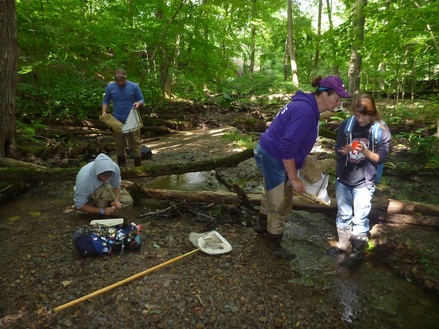 Students from IUP, Pitt, and Clarion sampling stream biota.
Students from IUP, Pitt, and Clarion sampling stream biota.
Posted by Kristine Trotta (U. Pittsburgh):
The end of the first week of classes leaves me excited for the next two weeks. I was unsure of what to expect of the actual class set up, but so far it is exactly what I was expecting and hoping for – except the amount of mosquitoes is much worse then what I ever could have imagined. I have already learned a few field techniques that will be helpful to use in the future. I also learned that tree and plant identification is not something I excel at. It’s been exciting to find so many frogs, toads, salamanders, and crayfish so soon in the class. I have even found many of the aquatic insects to be quite interesting as well, even if they are creepy and gross.
I started to get a bit antsy about finding a group project that I was going to be truly interested in. Many classmates seemed to really enjoy plants, trees, and insects and while I appreciate all of those ecological aspects I had my heart set on working with amphibians, birds or small mammals. Luckily, on the drive home I expressed this concern out loud and was happy to find a few people that also had the same interest! So our group and idea began to form and we narrowed it down to a small mammal project. I am already grateful for an awesome group to work with that is equally excited as me to get this project going. Regardless of the hundreds of scary insects I have encounter and the countless mosquito bites I have endured, I am very much looking forward to getting this small mammal party started next week!
Posted by Scott Stanek (IUP):
The first week has gone great! We took trips to the field to survey trees with the point-quarter method and collected macro invertebrates in streams. While looking at the trees, my partner and I found a newt crawling around. Walking around in the streams started out pretty miserable in the rain but it cleared up. We were able to find several types of fish, crayfish, and some salamanders.
We started planning our group projects too. My group has decided to attempt to catch small mammals in the Tryon-Weber Woods and in areas around the Housing Site and Sanctuary Site. We want to look at vegetation, ground cover, and proximity to human habitation. We’ve been putting together our project proposal and presentation with ease. I’m looking forward to get out in the field to set our traps and start collecting data.
The end of the first week of classes leaves me excited for the next two weeks. I was unsure of what to expect of the actual class set up, but so far it is exactly what I was expecting and hoping for – except the amount of mosquitoes is much worse then what I ever could have imagined. I have already learned a few field techniques that will be helpful to use in the future. I also learned that tree and plant identification is not something I excel at. It’s been exciting to find so many frogs, toads, salamanders, and crayfish so soon in the class. I have even found many of the aquatic insects to be quite interesting as well, even if they are creepy and gross.
I started to get a bit antsy about finding a group project that I was going to be truly interested in. Many classmates seemed to really enjoy plants, trees, and insects and while I appreciate all of those ecological aspects I had my heart set on working with amphibians, birds or small mammals. Luckily, on the drive home I expressed this concern out loud and was happy to find a few people that also had the same interest! So our group and idea began to form and we narrowed it down to a small mammal project. I am already grateful for an awesome group to work with that is equally excited as me to get this project going. Regardless of the hundreds of scary insects I have encounter and the countless mosquito bites I have endured, I am very much looking forward to getting this small mammal party started next week!
Posted by Scott Stanek (IUP):
The first week has gone great! We took trips to the field to survey trees with the point-quarter method and collected macro invertebrates in streams. While looking at the trees, my partner and I found a newt crawling around. Walking around in the streams started out pretty miserable in the rain but it cleared up. We were able to find several types of fish, crayfish, and some salamanders.
We started planning our group projects too. My group has decided to attempt to catch small mammals in the Tryon-Weber Woods and in areas around the Housing Site and Sanctuary Site. We want to look at vegetation, ground cover, and proximity to human habitation. We’ve been putting together our project proposal and presentation with ease. I’m looking forward to get out in the field to set our traps and start collecting data.
An Experience and a Half
Posted by Ian Anderson (U. Pittsburgh):
Week one at Pymatuning has been an experience and a half. The concept of a course with most of the work being done outside a traditional classroom is something that should be done much more often. The advantage of doing hands on work has been a revelation. Point quarter method, stream sampling, and the wonders of poison ivy have been important lessons that can only be taught in the field. By far my favorite place has been the Tryon-Weber Woods when we sampled the stream with Surber samplers. Something I initially viewed as small, insignificant stream was in fact full of life. Crawdads, fish, salamanders, insects, and all other sorts of life were well hidden in the stream. With one week down and a daunting project ahead, the next two weeks will be just as interesting.
Week one at Pymatuning has been an experience and a half. The concept of a course with most of the work being done outside a traditional classroom is something that should be done much more often. The advantage of doing hands on work has been a revelation. Point quarter method, stream sampling, and the wonders of poison ivy have been important lessons that can only be taught in the field. By far my favorite place has been the Tryon-Weber Woods when we sampled the stream with Surber samplers. Something I initially viewed as small, insignificant stream was in fact full of life. Crawdads, fish, salamanders, insects, and all other sorts of life were well hidden in the stream. With one week down and a daunting project ahead, the next two weeks will be just as interesting.
Memorable Moments
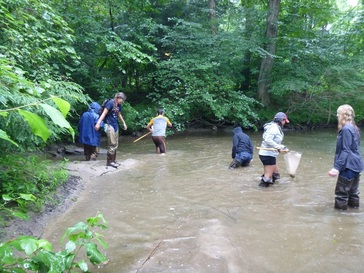 Student negotiating the deep waters of Linesville Creek.
Student negotiating the deep waters of Linesville Creek.
Posted by Dean Jepson (U. Pittsburgh):
I have had many great experiences during my first week at Pymatuning Lake enrolled in the ecology Field Techniques course. One memorable moment I had was the day we went into Tryon Weber woods to identify and research local organisms found in the area. This was extremely interesting because I found many organisms that I have never seen before, such as a large spider missing three legs and a Northern Dusky Salamander. Furthermore, this opportunity showed me that there are copious interesting organisms to see in the woodlands if your just take a closer look. Additionally, this also gave me the opportunity to apply the knowledge I previously gained from my previous ecology class.
Another amazing experience I had during my first week at Pymatuning Lake was utilizing the activities that are available, such as the canoes. With this ability to take the canoes out, I had the opportunity to explore the lake and islands, had the chance to make new friends and observed beautiful scenery. During our canoe trips we went swimming, hiking and beheld a beautiful sunset that would take anyone’s breath away. These experiences will not only be with me for the remainder of the class, but will be remembered forever.
Posted by Andrew McCrea (U. Pittsburgh):
After completing the first week of class at Pymatuning, I am very happy with the course. I have a good group of friends here and we are working on the same group project together. We have complete control over our project and we are shaping it toward our interests. The weather has been great and since the first two days the mosquitoes have not been a problem. The class is nothing like a lecture based class; class is very hands on and I am learning a lot more.
We are about to pitch our project starting Monday morning and I am hoping everything goes smoothly. We don't have the greatest amount of experience but everyone within our group is really excited to start work and make some headway. I really enjoy that I get to canoe daily to do my work and spend so much time on the water. It’s a great aspect of the housing site and while canoeing at sunset the view is beautiful over the lake.
I have had many great experiences during my first week at Pymatuning Lake enrolled in the ecology Field Techniques course. One memorable moment I had was the day we went into Tryon Weber woods to identify and research local organisms found in the area. This was extremely interesting because I found many organisms that I have never seen before, such as a large spider missing three legs and a Northern Dusky Salamander. Furthermore, this opportunity showed me that there are copious interesting organisms to see in the woodlands if your just take a closer look. Additionally, this also gave me the opportunity to apply the knowledge I previously gained from my previous ecology class.
Another amazing experience I had during my first week at Pymatuning Lake was utilizing the activities that are available, such as the canoes. With this ability to take the canoes out, I had the opportunity to explore the lake and islands, had the chance to make new friends and observed beautiful scenery. During our canoe trips we went swimming, hiking and beheld a beautiful sunset that would take anyone’s breath away. These experiences will not only be with me for the remainder of the class, but will be remembered forever.
Posted by Andrew McCrea (U. Pittsburgh):
After completing the first week of class at Pymatuning, I am very happy with the course. I have a good group of friends here and we are working on the same group project together. We have complete control over our project and we are shaping it toward our interests. The weather has been great and since the first two days the mosquitoes have not been a problem. The class is nothing like a lecture based class; class is very hands on and I am learning a lot more.
We are about to pitch our project starting Monday morning and I am hoping everything goes smoothly. We don't have the greatest amount of experience but everyone within our group is really excited to start work and make some headway. I really enjoy that I get to canoe daily to do my work and spend so much time on the water. It’s a great aspect of the housing site and while canoeing at sunset the view is beautiful over the lake.
Week 1 draws to a close
Posted by Dr. Joe Townsend (IUP):
As week one of the Field Techniques course at PLE draws to a close, students are hard at work with the teams developing project proposals for the research they would like to carry out over the next two weeks. Over the first week, students have been exposed to methods for estimating tree density and sampling aquatic and terrestrial systems, and our four student research teams have been formed and are already getting to work. Research project development is going really well (from my perspective!), with groups interested in the freshwater stream ecology, rare and endangered plants in relictual wetlands, small mammal diversity in disturbed and undisturbed habitats, and patterns of diversity on different sized islands in Pymatuning Lake. Should be an exciting couple of weeks as these project move from the “planning” to the “doing” stage!
Some photos from Week 1 activities:
As week one of the Field Techniques course at PLE draws to a close, students are hard at work with the teams developing project proposals for the research they would like to carry out over the next two weeks. Over the first week, students have been exposed to methods for estimating tree density and sampling aquatic and terrestrial systems, and our four student research teams have been formed and are already getting to work. Research project development is going really well (from my perspective!), with groups interested in the freshwater stream ecology, rare and endangered plants in relictual wetlands, small mammal diversity in disturbed and undisturbed habitats, and patterns of diversity on different sized islands in Pymatuning Lake. Should be an exciting couple of weeks as these project move from the “planning” to the “doing” stage!
Some photos from Week 1 activities:
"Why am I here?" continued...
Posted by Carly Moore (Clarion U.):
I have wanted to do something in the environmental field since I was pretty young. Growing up surrounded by the Allegheny National Forest makes if quite difficult to not love the outdoors. My family has always enjoyed camping, hiking, and kayaking in the ANF. My dad instilled my brothers and I with appreciation of the environment. My brother has also been a huge inspiration to pursue an environmental biology degree. He has a bachelor’s in Parks and Rec. and masters in GIS and loves the work he does for the DEP.
Field Techniques in Ecology and Conservation seemed like the most useful and diverse class offered at Pymatuning. Because I do not know what I want to do with my major I thought this class might direct me. Whether I end up loving or hating an aspect of class at it will have at least helped me in some way. I also chose to do a class at Pymatuning to gain experience and do more hands on work in the field.
Posted by Dylan Hiles (IUP):
This is a question I have frequently asked myself over the years. After switching my major to Biology I knew I had made the right decision, but have always been unsure as to what exactly I would like to do with it. Conservation, Ecology and Environmental Science seemed right up my alley. Having grown up in a rural area with self-proclaimed “rednecks” for relatives, I have spent my fair share of time in the great outdoors enjoying nature. I knew that I had a deep connection with the natural world around me, and decided that I would take it upon myself to conserve and protect this land so that one day future generations can enjoy it as much as I have.
But I was still unsure as to how I would accomplish this. I was unsure of where to start, and even more unsure of which direction to travel, so I decided to focus on my classes and hope that they would help me discover what exactly I wanted to do in the field of conservation. After many classes and many semesters I was still unsure. One thing I did know was that I would love the opportunity to spend time outside working in the field. This is where my field techniques course at Pymatuning Laboratory of Ecology comes into play. Since I was required to take a field course for my major anyways, I decided what better way to get out in the field and get hands on experience than taking a field techniques course. I’m hoping that throughout my time here I will gain valuable knowledge of techniques used in the field for research, and that this will help me decide what I direction I would like to go.
Posted by Kristine Trotta (U. Pittsburgh):
I am here to expand my knowledge and skills in ecology and conservation field work. I have been involved in some great field projects, but they have mostly been veterinary based. I will be involved in future field projects and research, but I eventually would like to come up with my own projects instead of being a part of someone else’s idea. I am passionate about wildlife conservation and veterinary medicine and I am immersed in a career that gives me the opportunity to be a real part of that. I want to be able to take full advantage of any opportunity that comes up and broadening my knowledge of all types of field work will only make me better prepared.
I would like to be confident in my ability to come up with my own good idea for a conservation project or research, whether it’s locally or internationally, and be able to execute it well. My scope of knowledge and skills is currently largely veterinary-based, but I want to broaden my skills in order to come up field work that is well rounded in ecology as well.
Posted by Skylar King (U. Pittsburgh):
The year before last, there was a presentation about PLE in one of my classes. Three weeks running around in the woods and learning about things I actually liked? I thought it looked great, so I decided to take Ecology here over the summer. It was a blast, and I learned more in those three weeks than I've probably learned in full semester classes. This year, I chose to come back and take Field Techniques in Ecology & Conservation with Dr. Townsend. I feel like it’s a good way to help figure out if I’m on the right path. It's hands-on, practical experience in field research, and I’ll have a chance to do some independent work - I'll get to learn things I can actually apply as I finish school and move on to a career. Plus, I get to do all of these things in a gorgeous place with great, like-minded people!
Posted by Lisa Geer (Clarion U.):
“Why am I here?” Today as I walked through the woods with students less than half of my age, this question may have crossed my mind. I sent my husband a text that perhaps answered that question. I texted, “If I survive this I will feel accomplished!” I am the mother of 4 and the stepmother of 4. I have 12 step-grandchildren. The life I had planned and the life I have lived are two totally different lives! I learned at 21 when my Dad died from a heart attack in my arms and 6 weeks later when my brother died from cancer that life’s plans are not always in your control. My plan through high school was to become a veterinarian. I got married instead and 2 years later started a family. When I was 6 months pregnant with my second child, my husband left me for another woman and never looked back. I worked 5 jobs to make ends meet and met my second husband. We lost a baby when I was 6 months pregnant and then had a daughter. He was abusive and left when our daughter was 5 months old, beating me up and kicking me down with her in my arms. We had a restaurant (he was a chef, but was dyslexic and struggled in the workplace) and I continued that restaurant because it allowed me to be with my children at work. I worked 14-16 hours a day, 7 days a week. I then met my third husband and we had a daughter together. Life was finally beautiful and I developed Lupus.
I, like my brother, have little control over what this disease will do to my body. I do have control over my acceptance of how I will live the rest of my life. I refuse to allow this disease stop me from reaching my goals and dreams. I can feel sick doing what I love to do in life, or I can feel sick lying in bed. I choose to live and experience everything I love in life. My family, animals, and nature are all at the top of that list. I am here because I would like to get a taste of my options working in this field. I loved my ecology class so much and the enthusiasm that my professor brought to it, that I changed majors from pre-vet to environmental biology. I have worked hard and have 3 semesters left. The past 2 semesters I had all A’s.
I am here to work hard and to experience a small taste of being an environmental biologist. I want to know that I can do this and my dream will be fulfilled. I want to make sure that I will “love” what I do. So far, so good…well except maybe for the mosquitos, but I guess I am in their home so I will have to learn to coexist. After these 3 weeks I hope to have confidence and direction for my future plans. The plan is to travel after our youngest (she is 14 yrs old) graduates and heads to college. Everywhere we travel to now, I am always checking out what job possibilities would interest me in that area, whether it is research, writing or zoos. I am keeping an open mind and I will never say “never”!
Posted by Stefanie Benvenuto (U. Pittsburgh):
I decided to take classes at Pymatuming because I thought it would be a great way to earn my final six credits in order to graduate from the University of Pittsburgh while having a little fun and getting introduced to a subject that I was not very familiar with. I decided to transfer to the University of Pittsburgh from Penn State University my senior year for personal family reasons, and although the majority of my credits transferred, I was short credits from Pitt that I needed to graduate. Therefore, I am here to finish my degree this summer before I begin nursing school.
It is no surprise that this class is out of my comfort zone, especially since I am starting nursing school in two months. At first when I decided to take these two courses, I would have been lying if I said I was happy about the idea of spending my summer exploring the woods; however, I feel that the courses offered here at Pymatuming have giving me the opportunity to learn about different aspects of the environment that I may have never had time to explore. Through this class, I hope to expand my knowledge on the techniques that I learned in my previous class session, disease ecology, as well as learn new field techniques that we did not have time to cover. These hands on, active classes, have been very beneficial thus far and I can not wait to see what else I can learn through this class.
“Look deep into nature, and then you will understand everything better” - Albert Einstein
Posted by Kayla Weinfurther (IUP):
As a child, when people asked ‘what do you want to do when you grow up’, I always said that I wanted to work with animals. It didn’t matter what kind of job, or how much money I would make, that was my only wish. Years later, I still have that same wish. Getting to that point however, is not as easy as I anticipated. Two years of college as a biology major have not helped me to determine where I am headed in the biology field. I have not had the opportunity to experience many important aspects of the major, and I hope to do so in this course at PLE.
I first heard about PLE from Dr. Townsend, who took every chance he had to try and promote PLE summer classes to his students. He took the time to visit other classes to talk about the classes they offered, and how much fun students had when taking them. I only heard positive things about PLE from both students and professors, which finally sold me on the idea. So far, I’ve never had any field experience. This class gives me the opportunity to get that experience, and will hopefully help me to decide my future in the biology field. I’m looking forward to see what this class has to offer!
Posted by Andrew McCrea (U. Pittsburgh):
I am taking this course is to fulfill a requirement so that I can graduate from the University of Pittsburgh. I am an environmental studies major and three weeks away from graduating. After graduation I plan on becoming a National Park Ranger, so I have an interest in ecology. Plain and simply I enjoy being outside and being immersed in nature. I believe that this class will give me great separation from living in Oakland for the past two years of my life.
I hope that this class will help me understand and develop my thinking while working with animals and conservation efforts. I know a good bit about larger animals in the surrounding area; I hope that this course will allow me to learn more about animals like macro-invertebrates and more aquatic species.
Posted by Scott Stanek (IUP):
The most obvious answer is because I need these credits to graduate. Dr. Townsend told me this was a great class to take and that he was teaching it. I figured it would be like camping. In other news, I’m here to immerse myself in nature. I need to learn as much as I can about various species and their associations with others. Moreover, I’m here to learn techniques of studying biodiversity. Yeah, there’re trees, bugs, and birds, but there are so many more species of organisms that I need to learn to see in the different trophic levels.
I’m here because I like the outdoors. I’m hoping the techniques I learn here can be applied to other outings, scientific or leisurely, to take in my surroundings. I want to be able to point out things that are lesser known about an ecosystem to other people who don’t see the small details. By looking at the smaller details, more questions can be asked about the organisms in a particular ecosystem. I want to be able to formulate my questions into ideas and ultimately create testable hypotheses. Hopefully the techniques taught in this course will help me focus on a certain topic for future studies or look forward to a certain career.
Posted by Emily Williams (IUP):
I originally heard about PLE because for IUP you have to complete an on field research class; and PLE is one of the very few options we have to take. I tried to get out of it of really hard. I just didn't like the idea of having to go stay somewhere for three weeks during the summer for school. Summer is supposed to be my time off! But as I talked to Dr. Townsend and other students about it I realized how good of a time this really could be. I love to be outdoors, I love to camp, I love my major, and most of all I love to socialize. PLE is all of that into one. Basically I wanted to make friends that I could hang out with all day outside and do cool stuff.
What I want to do after I graduate is up in the air; I'm not exactly sure what's going to happen. Therefore, coming here seemed like it would be a great opportunity to go out in the field and try different techniques out. Sometimes actually going out into the field and working hands on with something can open your mind to something that you never thought you had interest in. That's exactly what I want to get out of these next three weeks. I'm opening my mind to everything and hopefully I'll get on some kind of track for what I want to do. You never know what can happen in three weeks!
I have wanted to do something in the environmental field since I was pretty young. Growing up surrounded by the Allegheny National Forest makes if quite difficult to not love the outdoors. My family has always enjoyed camping, hiking, and kayaking in the ANF. My dad instilled my brothers and I with appreciation of the environment. My brother has also been a huge inspiration to pursue an environmental biology degree. He has a bachelor’s in Parks and Rec. and masters in GIS and loves the work he does for the DEP.
Field Techniques in Ecology and Conservation seemed like the most useful and diverse class offered at Pymatuning. Because I do not know what I want to do with my major I thought this class might direct me. Whether I end up loving or hating an aspect of class at it will have at least helped me in some way. I also chose to do a class at Pymatuning to gain experience and do more hands on work in the field.
Posted by Dylan Hiles (IUP):
This is a question I have frequently asked myself over the years. After switching my major to Biology I knew I had made the right decision, but have always been unsure as to what exactly I would like to do with it. Conservation, Ecology and Environmental Science seemed right up my alley. Having grown up in a rural area with self-proclaimed “rednecks” for relatives, I have spent my fair share of time in the great outdoors enjoying nature. I knew that I had a deep connection with the natural world around me, and decided that I would take it upon myself to conserve and protect this land so that one day future generations can enjoy it as much as I have.
But I was still unsure as to how I would accomplish this. I was unsure of where to start, and even more unsure of which direction to travel, so I decided to focus on my classes and hope that they would help me discover what exactly I wanted to do in the field of conservation. After many classes and many semesters I was still unsure. One thing I did know was that I would love the opportunity to spend time outside working in the field. This is where my field techniques course at Pymatuning Laboratory of Ecology comes into play. Since I was required to take a field course for my major anyways, I decided what better way to get out in the field and get hands on experience than taking a field techniques course. I’m hoping that throughout my time here I will gain valuable knowledge of techniques used in the field for research, and that this will help me decide what I direction I would like to go.
Posted by Kristine Trotta (U. Pittsburgh):
I am here to expand my knowledge and skills in ecology and conservation field work. I have been involved in some great field projects, but they have mostly been veterinary based. I will be involved in future field projects and research, but I eventually would like to come up with my own projects instead of being a part of someone else’s idea. I am passionate about wildlife conservation and veterinary medicine and I am immersed in a career that gives me the opportunity to be a real part of that. I want to be able to take full advantage of any opportunity that comes up and broadening my knowledge of all types of field work will only make me better prepared.
I would like to be confident in my ability to come up with my own good idea for a conservation project or research, whether it’s locally or internationally, and be able to execute it well. My scope of knowledge and skills is currently largely veterinary-based, but I want to broaden my skills in order to come up field work that is well rounded in ecology as well.
Posted by Skylar King (U. Pittsburgh):
The year before last, there was a presentation about PLE in one of my classes. Three weeks running around in the woods and learning about things I actually liked? I thought it looked great, so I decided to take Ecology here over the summer. It was a blast, and I learned more in those three weeks than I've probably learned in full semester classes. This year, I chose to come back and take Field Techniques in Ecology & Conservation with Dr. Townsend. I feel like it’s a good way to help figure out if I’m on the right path. It's hands-on, practical experience in field research, and I’ll have a chance to do some independent work - I'll get to learn things I can actually apply as I finish school and move on to a career. Plus, I get to do all of these things in a gorgeous place with great, like-minded people!
Posted by Lisa Geer (Clarion U.):
“Why am I here?” Today as I walked through the woods with students less than half of my age, this question may have crossed my mind. I sent my husband a text that perhaps answered that question. I texted, “If I survive this I will feel accomplished!” I am the mother of 4 and the stepmother of 4. I have 12 step-grandchildren. The life I had planned and the life I have lived are two totally different lives! I learned at 21 when my Dad died from a heart attack in my arms and 6 weeks later when my brother died from cancer that life’s plans are not always in your control. My plan through high school was to become a veterinarian. I got married instead and 2 years later started a family. When I was 6 months pregnant with my second child, my husband left me for another woman and never looked back. I worked 5 jobs to make ends meet and met my second husband. We lost a baby when I was 6 months pregnant and then had a daughter. He was abusive and left when our daughter was 5 months old, beating me up and kicking me down with her in my arms. We had a restaurant (he was a chef, but was dyslexic and struggled in the workplace) and I continued that restaurant because it allowed me to be with my children at work. I worked 14-16 hours a day, 7 days a week. I then met my third husband and we had a daughter together. Life was finally beautiful and I developed Lupus.
I, like my brother, have little control over what this disease will do to my body. I do have control over my acceptance of how I will live the rest of my life. I refuse to allow this disease stop me from reaching my goals and dreams. I can feel sick doing what I love to do in life, or I can feel sick lying in bed. I choose to live and experience everything I love in life. My family, animals, and nature are all at the top of that list. I am here because I would like to get a taste of my options working in this field. I loved my ecology class so much and the enthusiasm that my professor brought to it, that I changed majors from pre-vet to environmental biology. I have worked hard and have 3 semesters left. The past 2 semesters I had all A’s.
I am here to work hard and to experience a small taste of being an environmental biologist. I want to know that I can do this and my dream will be fulfilled. I want to make sure that I will “love” what I do. So far, so good…well except maybe for the mosquitos, but I guess I am in their home so I will have to learn to coexist. After these 3 weeks I hope to have confidence and direction for my future plans. The plan is to travel after our youngest (she is 14 yrs old) graduates and heads to college. Everywhere we travel to now, I am always checking out what job possibilities would interest me in that area, whether it is research, writing or zoos. I am keeping an open mind and I will never say “never”!
Posted by Stefanie Benvenuto (U. Pittsburgh):
I decided to take classes at Pymatuming because I thought it would be a great way to earn my final six credits in order to graduate from the University of Pittsburgh while having a little fun and getting introduced to a subject that I was not very familiar with. I decided to transfer to the University of Pittsburgh from Penn State University my senior year for personal family reasons, and although the majority of my credits transferred, I was short credits from Pitt that I needed to graduate. Therefore, I am here to finish my degree this summer before I begin nursing school.
It is no surprise that this class is out of my comfort zone, especially since I am starting nursing school in two months. At first when I decided to take these two courses, I would have been lying if I said I was happy about the idea of spending my summer exploring the woods; however, I feel that the courses offered here at Pymatuming have giving me the opportunity to learn about different aspects of the environment that I may have never had time to explore. Through this class, I hope to expand my knowledge on the techniques that I learned in my previous class session, disease ecology, as well as learn new field techniques that we did not have time to cover. These hands on, active classes, have been very beneficial thus far and I can not wait to see what else I can learn through this class.
“Look deep into nature, and then you will understand everything better” - Albert Einstein
Posted by Kayla Weinfurther (IUP):
As a child, when people asked ‘what do you want to do when you grow up’, I always said that I wanted to work with animals. It didn’t matter what kind of job, or how much money I would make, that was my only wish. Years later, I still have that same wish. Getting to that point however, is not as easy as I anticipated. Two years of college as a biology major have not helped me to determine where I am headed in the biology field. I have not had the opportunity to experience many important aspects of the major, and I hope to do so in this course at PLE.
I first heard about PLE from Dr. Townsend, who took every chance he had to try and promote PLE summer classes to his students. He took the time to visit other classes to talk about the classes they offered, and how much fun students had when taking them. I only heard positive things about PLE from both students and professors, which finally sold me on the idea. So far, I’ve never had any field experience. This class gives me the opportunity to get that experience, and will hopefully help me to decide my future in the biology field. I’m looking forward to see what this class has to offer!
Posted by Andrew McCrea (U. Pittsburgh):
I am taking this course is to fulfill a requirement so that I can graduate from the University of Pittsburgh. I am an environmental studies major and three weeks away from graduating. After graduation I plan on becoming a National Park Ranger, so I have an interest in ecology. Plain and simply I enjoy being outside and being immersed in nature. I believe that this class will give me great separation from living in Oakland for the past two years of my life.
I hope that this class will help me understand and develop my thinking while working with animals and conservation efforts. I know a good bit about larger animals in the surrounding area; I hope that this course will allow me to learn more about animals like macro-invertebrates and more aquatic species.
Posted by Scott Stanek (IUP):
The most obvious answer is because I need these credits to graduate. Dr. Townsend told me this was a great class to take and that he was teaching it. I figured it would be like camping. In other news, I’m here to immerse myself in nature. I need to learn as much as I can about various species and their associations with others. Moreover, I’m here to learn techniques of studying biodiversity. Yeah, there’re trees, bugs, and birds, but there are so many more species of organisms that I need to learn to see in the different trophic levels.
I’m here because I like the outdoors. I’m hoping the techniques I learn here can be applied to other outings, scientific or leisurely, to take in my surroundings. I want to be able to point out things that are lesser known about an ecosystem to other people who don’t see the small details. By looking at the smaller details, more questions can be asked about the organisms in a particular ecosystem. I want to be able to formulate my questions into ideas and ultimately create testable hypotheses. Hopefully the techniques taught in this course will help me focus on a certain topic for future studies or look forward to a certain career.
Posted by Emily Williams (IUP):
I originally heard about PLE because for IUP you have to complete an on field research class; and PLE is one of the very few options we have to take. I tried to get out of it of really hard. I just didn't like the idea of having to go stay somewhere for three weeks during the summer for school. Summer is supposed to be my time off! But as I talked to Dr. Townsend and other students about it I realized how good of a time this really could be. I love to be outdoors, I love to camp, I love my major, and most of all I love to socialize. PLE is all of that into one. Basically I wanted to make friends that I could hang out with all day outside and do cool stuff.
What I want to do after I graduate is up in the air; I'm not exactly sure what's going to happen. Therefore, coming here seemed like it would be a great opportunity to go out in the field and try different techniques out. Sometimes actually going out into the field and working hands on with something can open your mind to something that you never thought you had interest in. That's exactly what I want to get out of these next three weeks. I'm opening my mind to everything and hopefully I'll get on some kind of track for what I want to do. You never know what can happen in three weeks!
"Why am I here?"
For their first blog posts, I asked students to answer a seemingly simple question... Why are you here? I wanted to find out what motivated each student to enroll in a summer field course that covered such a broad set of methods and topics. Below are their responses... Revealing? Yes. Insightful? Sometimes... Honest? Completely!
Here is the first batch of blogs... enjoy!
Posted by Madeline Kelley (U. Pittsburgh):
As a teenager I had many wild ideas about what kind of job I would like to have as an adult. With each new work experience my plans molded, some jobs or aspects of them placed in the ‘never in a million year box’. I seemed to have stopped at every exit along the way; music career, teacher, the medical field, engineer, geologist, and anthropologist. For a while, it seemed the description of my dream job was becoming vaguer, “Something that makes me happy, Involves the outdoors, and I won’t get bored with after 10 years.”
To no surprise to my family I quickly got nervous, and began packing in internships and volunteer opportunities hoping I would find the one. Why I was doing more internships than I needed to graduate? I now know why after watching a TED talk giving by Dan Gilbert. He presents his work on how humans can imagine their future and make decision based on a choice’s perceived out. What I took from his talk is my mind has no idea what each career path really entailed, and I need to experience it firsthand.
Why I am I here? I think I have found at least the family of career paths I wish to head down. I am really enjoying the ecology research I have been doing this summer. I didn’t want to pass up the opportunity to get experience in other types of field work. I’m excited to learn field techniques used in different environments. I’m also eager to see how I like working in the locations, each with its own set of difficulties.
Posted by Cameron Fiss (IUP):
If you were to tell me five years ago that field techniques would be the last undergraduate class I would take, I would probably have a tough time believing it. I mean, heck, I started college as an undecided business major and even thought about majoring in finance for a while. I guess you could say I had a tough time deciding exactly what it is I wanted to do, but being a business major helped me decide that I definitely did not want to pursue a degree in business (or maybe that’s just how I rationalize wasting an entire year). Anyway, after a brief stint as geography major, I found my way to the biology department. After spending some time in the biology department at IUP and meeting some great professors as well as some awesome students, my initial interest in conservation and ecology grew into a fascination and overall love for the field. One thing in particular that I took away from being an ecology and conservation student was that I eventually wanted to conduct my own research. After spending some time in the field, I quickly discovered that the ability to organize and collect data in the field is an invaluable skill for someone looking to conducting their own research. When the chance to go to Pymatuning to study field techniques and fulfill a graduation requirement at the same time arose, it was an easy decision to sign up.
Posted by Dean Jepson (U. Pittsburgh):
I originally enrolled in Field Techniques in Ecology and Conservation at Pymatuning Lake to fulfill a few science credits, however, it has since evolved into more. As the summer progressed I became excited to take this course since it will allow me the opportunity to experience a new learning atmosphere that I have never previously encountered. Furthermore, since I am pursuing a degree in dentistry I do not have the opportunity to take a large amount of ecology courses, and I thought this class would be the perfect opportunity to see the ecological side of the science field. I am excited to take this class because this course will allow me to have the chance to step outside the usual classroom setting, and see personally the organisms and ecology field techniques that I read about in my previous ecology class.
Posted by Ian Anderson (U. Pittsburgh):
The reasons for doing a course at Pymatuning are different for everyone. For myself I found the idea of spending three weeks in a Pennsylvania forest to be a very appealing one. I have spent most of my life in Pennsylvania and I love the nature and character of this state. It has a vibrant ecological make up that I find infinitely interesting. I like spending time in my local environment and continuing my understanding of it; I appreciate the deserts of the South West and Great Plains but I do not have the same connection I have with the forests of Pennsylvania. I chose this course for its connection to the state and for the contents. Learning field techniques is something I’ve never done and will be a valuable skill in the years to come.
Posted by Emily Dittman (Clarion U.):
I am here mostly because I needed field course credits. I figured that a course at the Pymatuming Laboratory of Ecology would be a good place to fulfill that. I found out about PLE through people at Clarion University. I looked at all the available options of courses to take and decided on this one, plus with other things going on over the summer I needed to take a course that was more towards the end. I figured field methods would be best and provide me with a lot of hands on experience with all kinds of different methods used by people who do this kind of stuff for their job. It also looked like there were all kinds of research and studying being done in the Pymatuming area. It’s an area not too far from home with a lot more being done here than I ever realized. So overall I thought this would be a good place to get y field credits, and to also get some experience and meet people who do those kind of things for a living.
Posted by Emily Szoszorek (U. Pittsburgh):
Being a Pitt student with an environmental studies major, I am required to take a field study. The default field course is a pricey trip to Yellowstone national park—which would have been amazing, don’t get me wrong. Since I had concerns with my funding, my supervisor suggested for me to try a course at the lovely pymatuning laboratory of ecology. Weighing out my options, I decided to try PLE but I still was left with one question. Which course should I take?
I wanted to take an ecology course because I have yet to study it. While all the courses offered sounded interesting, I needed to start from the basics. I avoided the specialized topics and focused on the courses that were generalized. I read the class description of the general ecology course and compared it to field techniques in ecology & conservation. Based on the description alone, I felt like general ecology would be too much in my comfort zone. It looked like the standard class set up that focused more on theory, involved heavy reading, and required extensive studying. I have experienced a traditional style class for as long as I can remember.
I chose field techniques because it looked like a more active learning experience. It seemed like we would spend less time reading about ecology theory and more time using the tools which help support the theories. I picked this course because it seemed like it would be more challenging for me due to its practical approach.
Posted by Gabryel Malone (IUP):
I knew that I wanted to come here after Dr. Townsend sold me on the whole idea of going to a sort of summer camp that incorporated all of the things that I wanted in a camp as well as have actual hands on experience. When I finally committed to signing up for a course I was pumped. The anticipation of going to camp grew as the summer neared the fourth week. I’m not going to lie but I was actually super excited to come to “camp” and I talked it up so much to all of my friends and family. I have always gone to camp every summer for a week when I was little, and I just love the idea of getting together with a bunch of other kids to share awesome experiences. And this doesn’t seem like anything less than that. I knew coming into this that I would meet really interesting and fun people that would make my time here even better, and I definitely have.
My entire life I have loved being outside, from when I grew up playing in the woods and creek behind my house in Georgia, to going hiking, camping, and just doing any activity that would keep up with my crazy antics. I always say that I want to go be outside and rub my face on everything because that’s exactly what I would rather be doing than being inside attached to some electronic device that will more than likely suck me into being a zombie for an extended period of time. So this camp seemed great to not only further my knowledge and experience biologically in the field but to have an amazing time too!
Posted by Noelle Farook (U. Pittsburgh):
Earlier in the spring semester at Pitt, I had planned on interning with the amazingly sweet grad-student Kate LeCroy; I was going to assist in her pollinator research here at Pymatuning and other locations around the area. She found out last minute that she was able to graduate earlier without the extra research (which is great news!). Still, I was looking forward to going through the PLE experience and was pretty bummed. Then I realized I still had the opportunity to do and ecology course here, so I signed up soon after. Between talking to students who had taken courses here and the praises from Mark Collins, advisor for Environmental Studies at Pitt, I knew that it was something I didn’t want to pass up on.
I also figured that being in this environment could help me focus and hone in on what particular career path I may want take. Having changed majors a couple times and being an upcoming senior, I’m struggling to find a good fit; I don’t want to end up being the creepy super senior who never leaves. I know what I like, and I know what I’m good at (or rather I know what I’m not good at). Ecology and Research, Environmental Studies, and similar disciplines are fields that not only I can see myself doing but also what I see myself truly enjoying and caring about. Hopefully, being here at Pymatuning, being around similar minded people, and engaging in the opportunities available, will strengthen that notion.
Of course I would love to have the experience under my belt, and I know that doing programs like this has its networking benefits. But I didn’t fork up $490 solely for personal gain. Who wants to look back on their high-priced college education and think, there are so many things I wish I did when I had the chance? I think about the fact that most people will never be able to take a class like this, or even spend time in the facilities and environment we are surrounded by. We are extremely fortunate, and I am truly appreciative. Big, big thanks to Pitt and to the PLE staff here.
Here is the first batch of blogs... enjoy!
Posted by Madeline Kelley (U. Pittsburgh):
As a teenager I had many wild ideas about what kind of job I would like to have as an adult. With each new work experience my plans molded, some jobs or aspects of them placed in the ‘never in a million year box’. I seemed to have stopped at every exit along the way; music career, teacher, the medical field, engineer, geologist, and anthropologist. For a while, it seemed the description of my dream job was becoming vaguer, “Something that makes me happy, Involves the outdoors, and I won’t get bored with after 10 years.”
To no surprise to my family I quickly got nervous, and began packing in internships and volunteer opportunities hoping I would find the one. Why I was doing more internships than I needed to graduate? I now know why after watching a TED talk giving by Dan Gilbert. He presents his work on how humans can imagine their future and make decision based on a choice’s perceived out. What I took from his talk is my mind has no idea what each career path really entailed, and I need to experience it firsthand.
Why I am I here? I think I have found at least the family of career paths I wish to head down. I am really enjoying the ecology research I have been doing this summer. I didn’t want to pass up the opportunity to get experience in other types of field work. I’m excited to learn field techniques used in different environments. I’m also eager to see how I like working in the locations, each with its own set of difficulties.
Posted by Cameron Fiss (IUP):
If you were to tell me five years ago that field techniques would be the last undergraduate class I would take, I would probably have a tough time believing it. I mean, heck, I started college as an undecided business major and even thought about majoring in finance for a while. I guess you could say I had a tough time deciding exactly what it is I wanted to do, but being a business major helped me decide that I definitely did not want to pursue a degree in business (or maybe that’s just how I rationalize wasting an entire year). Anyway, after a brief stint as geography major, I found my way to the biology department. After spending some time in the biology department at IUP and meeting some great professors as well as some awesome students, my initial interest in conservation and ecology grew into a fascination and overall love for the field. One thing in particular that I took away from being an ecology and conservation student was that I eventually wanted to conduct my own research. After spending some time in the field, I quickly discovered that the ability to organize and collect data in the field is an invaluable skill for someone looking to conducting their own research. When the chance to go to Pymatuning to study field techniques and fulfill a graduation requirement at the same time arose, it was an easy decision to sign up.
Posted by Dean Jepson (U. Pittsburgh):
I originally enrolled in Field Techniques in Ecology and Conservation at Pymatuning Lake to fulfill a few science credits, however, it has since evolved into more. As the summer progressed I became excited to take this course since it will allow me the opportunity to experience a new learning atmosphere that I have never previously encountered. Furthermore, since I am pursuing a degree in dentistry I do not have the opportunity to take a large amount of ecology courses, and I thought this class would be the perfect opportunity to see the ecological side of the science field. I am excited to take this class because this course will allow me to have the chance to step outside the usual classroom setting, and see personally the organisms and ecology field techniques that I read about in my previous ecology class.
Posted by Ian Anderson (U. Pittsburgh):
The reasons for doing a course at Pymatuning are different for everyone. For myself I found the idea of spending three weeks in a Pennsylvania forest to be a very appealing one. I have spent most of my life in Pennsylvania and I love the nature and character of this state. It has a vibrant ecological make up that I find infinitely interesting. I like spending time in my local environment and continuing my understanding of it; I appreciate the deserts of the South West and Great Plains but I do not have the same connection I have with the forests of Pennsylvania. I chose this course for its connection to the state and for the contents. Learning field techniques is something I’ve never done and will be a valuable skill in the years to come.
Posted by Emily Dittman (Clarion U.):
I am here mostly because I needed field course credits. I figured that a course at the Pymatuming Laboratory of Ecology would be a good place to fulfill that. I found out about PLE through people at Clarion University. I looked at all the available options of courses to take and decided on this one, plus with other things going on over the summer I needed to take a course that was more towards the end. I figured field methods would be best and provide me with a lot of hands on experience with all kinds of different methods used by people who do this kind of stuff for their job. It also looked like there were all kinds of research and studying being done in the Pymatuming area. It’s an area not too far from home with a lot more being done here than I ever realized. So overall I thought this would be a good place to get y field credits, and to also get some experience and meet people who do those kind of things for a living.
Posted by Emily Szoszorek (U. Pittsburgh):
Being a Pitt student with an environmental studies major, I am required to take a field study. The default field course is a pricey trip to Yellowstone national park—which would have been amazing, don’t get me wrong. Since I had concerns with my funding, my supervisor suggested for me to try a course at the lovely pymatuning laboratory of ecology. Weighing out my options, I decided to try PLE but I still was left with one question. Which course should I take?
I wanted to take an ecology course because I have yet to study it. While all the courses offered sounded interesting, I needed to start from the basics. I avoided the specialized topics and focused on the courses that were generalized. I read the class description of the general ecology course and compared it to field techniques in ecology & conservation. Based on the description alone, I felt like general ecology would be too much in my comfort zone. It looked like the standard class set up that focused more on theory, involved heavy reading, and required extensive studying. I have experienced a traditional style class for as long as I can remember.
I chose field techniques because it looked like a more active learning experience. It seemed like we would spend less time reading about ecology theory and more time using the tools which help support the theories. I picked this course because it seemed like it would be more challenging for me due to its practical approach.
Posted by Gabryel Malone (IUP):
I knew that I wanted to come here after Dr. Townsend sold me on the whole idea of going to a sort of summer camp that incorporated all of the things that I wanted in a camp as well as have actual hands on experience. When I finally committed to signing up for a course I was pumped. The anticipation of going to camp grew as the summer neared the fourth week. I’m not going to lie but I was actually super excited to come to “camp” and I talked it up so much to all of my friends and family. I have always gone to camp every summer for a week when I was little, and I just love the idea of getting together with a bunch of other kids to share awesome experiences. And this doesn’t seem like anything less than that. I knew coming into this that I would meet really interesting and fun people that would make my time here even better, and I definitely have.
My entire life I have loved being outside, from when I grew up playing in the woods and creek behind my house in Georgia, to going hiking, camping, and just doing any activity that would keep up with my crazy antics. I always say that I want to go be outside and rub my face on everything because that’s exactly what I would rather be doing than being inside attached to some electronic device that will more than likely suck me into being a zombie for an extended period of time. So this camp seemed great to not only further my knowledge and experience biologically in the field but to have an amazing time too!
Posted by Noelle Farook (U. Pittsburgh):
Earlier in the spring semester at Pitt, I had planned on interning with the amazingly sweet grad-student Kate LeCroy; I was going to assist in her pollinator research here at Pymatuning and other locations around the area. She found out last minute that she was able to graduate earlier without the extra research (which is great news!). Still, I was looking forward to going through the PLE experience and was pretty bummed. Then I realized I still had the opportunity to do and ecology course here, so I signed up soon after. Between talking to students who had taken courses here and the praises from Mark Collins, advisor for Environmental Studies at Pitt, I knew that it was something I didn’t want to pass up on.
I also figured that being in this environment could help me focus and hone in on what particular career path I may want take. Having changed majors a couple times and being an upcoming senior, I’m struggling to find a good fit; I don’t want to end up being the creepy super senior who never leaves. I know what I like, and I know what I’m good at (or rather I know what I’m not good at). Ecology and Research, Environmental Studies, and similar disciplines are fields that not only I can see myself doing but also what I see myself truly enjoying and caring about. Hopefully, being here at Pymatuning, being around similar minded people, and engaging in the opportunities available, will strengthen that notion.
Of course I would love to have the experience under my belt, and I know that doing programs like this has its networking benefits. But I didn’t fork up $490 solely for personal gain. Who wants to look back on their high-priced college education and think, there are so many things I wish I did when I had the chance? I think about the fact that most people will never be able to take a class like this, or even spend time in the facilities and environment we are surrounded by. We are extremely fortunate, and I am truly appreciative. Big, big thanks to Pitt and to the PLE staff here.
Welcome to Field Techniques at PLE, Summer 2014
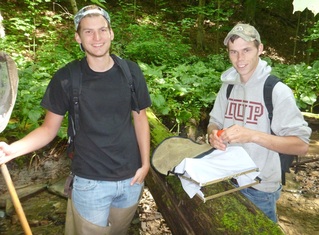 IUP students Dylan Hiles (left) and Cameron Fiss (right)
IUP students Dylan Hiles (left) and Cameron Fiss (right)
Posted by Dr. Joe Townsend (IUP)
Welcome to the blog for the Summer 2014 session of Field Techniques in Ecology and Conservation, at the University of Pittsburgh's Pymatuning Laboratory of Ecology (PLE). Here we will share our daily activities and experiences, from the students' perspectives as well as my own via daily student posts.
In this course, Field Techniques in Ecology & Conservation, students get the opportunity to gain hands-on experience in a variety of field-based methods, while developing and carrying out research projects in multidisciplinary student teams. Students will not only learn how to sample for plants, animals, and abiotic factors in both terrestrial and aquatic settings, but they will learn to ask relevant scientific questions that let them understand why to use a given method or approach.
A bit about the PLE Summer Program... PLE has developed a range of summer field courses that draw from a consortium of Pennsylvania universities, including The University of Pittsburgh and three satellite campuses, Clarion University, Edinboro University, Slippery Rock University, and my home institution, Indiana University of Pennsylvania (IUP). Students from these universities participate in over a dozen different courses taught by excellent instructors from participating schools.
Please join us over the coming weeks as students share their thoughts and experiences in the course, and I (try to) provide daily updates on class activities!
Welcome to the blog for the Summer 2014 session of Field Techniques in Ecology and Conservation, at the University of Pittsburgh's Pymatuning Laboratory of Ecology (PLE). Here we will share our daily activities and experiences, from the students' perspectives as well as my own via daily student posts.
In this course, Field Techniques in Ecology & Conservation, students get the opportunity to gain hands-on experience in a variety of field-based methods, while developing and carrying out research projects in multidisciplinary student teams. Students will not only learn how to sample for plants, animals, and abiotic factors in both terrestrial and aquatic settings, but they will learn to ask relevant scientific questions that let them understand why to use a given method or approach.
A bit about the PLE Summer Program... PLE has developed a range of summer field courses that draw from a consortium of Pennsylvania universities, including The University of Pittsburgh and three satellite campuses, Clarion University, Edinboro University, Slippery Rock University, and my home institution, Indiana University of Pennsylvania (IUP). Students from these universities participate in over a dozen different courses taught by excellent instructors from participating schools.
Please join us over the coming weeks as students share their thoughts and experiences in the course, and I (try to) provide daily updates on class activities!
